
COME BACK: Advertisements in ‘The West’ reminded of God’s love Page 5


The Parish. The Nation. The World.
Thursday June ,
Perth, Western Australia ● $1 Western Australia’s Award-winning Catholic newspaper
AID IS FOR KEEPS: Mission agency says Corby-aid link misplaced Page 3
GROWING JUSTICE: Talking about justice helps children grow VISTA 4
Parish Priests’ key role references will be ‘important’ for school enrolments
■ By Jamie O’Brien
Areference from a Parish Priest for parents who want to enrol their children in a Catholic school has become an important part of the enrolment process for Catholic education in Western Australia.
Not all Catholic schools had used references from parish priests as important factors to be considered in choosing who is accepted for enrolment.
It was confirmed this week that the policy is now applied across all Catholic schools in WA and has been since the beginning of the year.
However final decisions on who is enrolled will still be in the hands of school principals.
Catholic education director Ron Dullard told The Record that the policy is about providing an opportunity to further develop relationships between parents, the parish and the school.
The revised policy will mean parents who are involved with their parish will be given priority ahead of other Catholics outside the parish and non-Catholic students.
The policy will apply to all 158 Catholic primary and secondary schools in Western Australia.
Mr Dullard told The Record there is a high demand for entry into Catholic Schools, but this has not been a major factor in the adjustment of the policy.
However, the revised policy will not guarantee that parents keep up their appearances once the child is accepted in the school.
“This will depend on the relationship that develops between the parents and the parish,” Mr Dullard said.
“The greater involvement a family has with their parish the greater chance they have of being accepted into their Catholic school.
“The school is only part of the spiritual and religious development of the child.”
Mr Dullard said many Catholic secondary schools already recommend a reference, which normally
Continued on Page 6
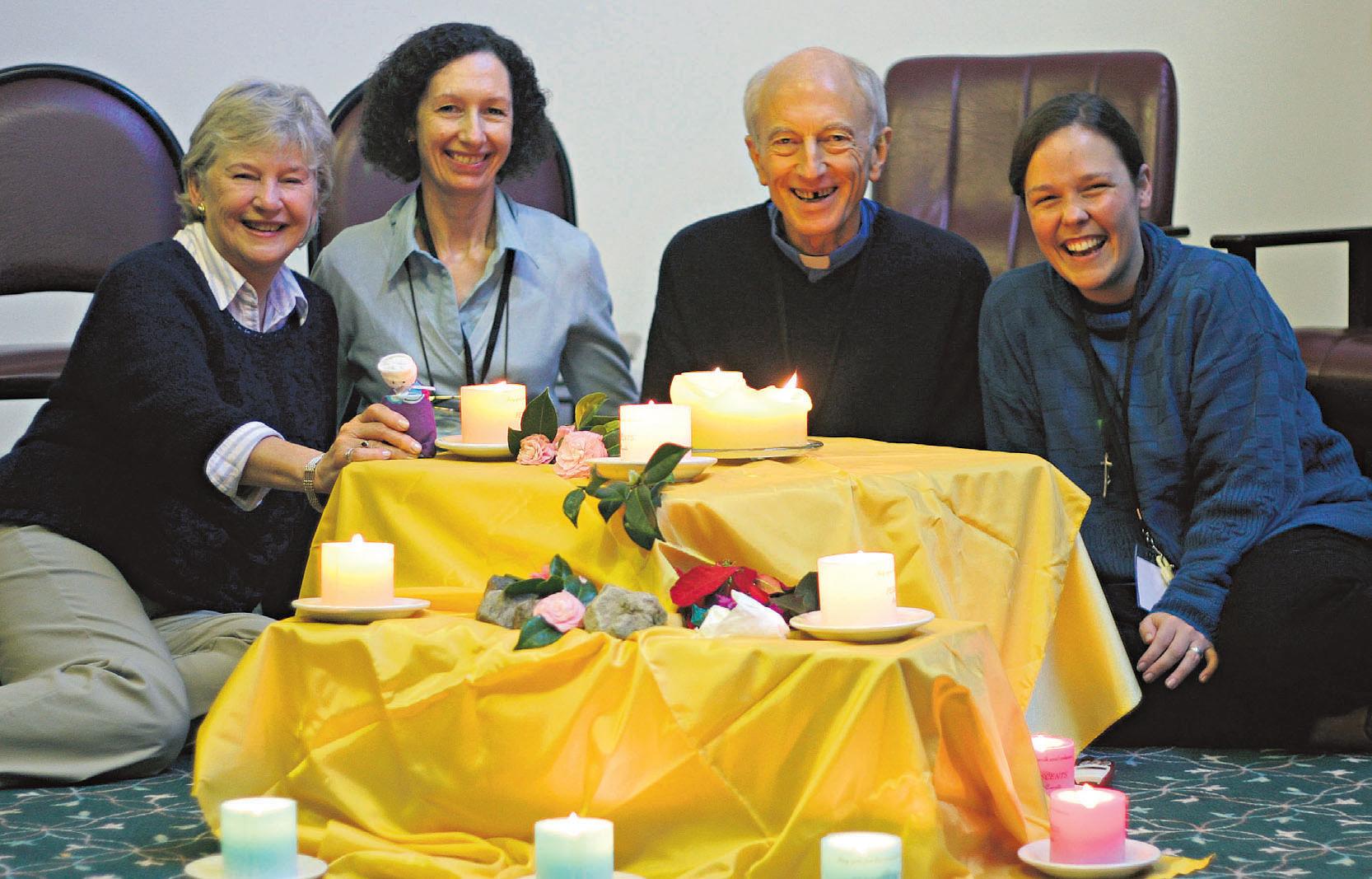
Prelate condemns Mugabe
An African archbishop has condemned the demolition of thousands of homes and businesses in Zimbabwe as “inhuman.”
Archbishop Robert Ndlovu of Harare, Zimbabwe’s capital, in a rare public attack on the government of President Robert Mugabe, spoke out at against the government’s Operation Drive Out Trash. He criticised the evictions in a June 12 radio interview with the British Broadcasting Corp.
Under the policy, bulldozers have cleared away buildings and market stalls the government considers illegal because they were
THE NEGLECTED VATICAN BEAT
John Allen reveals why so much reporting of the Vatican could be improved. VISTA

erected without the permission of the planning authorities.
The government said it also wants to combat shantytown crime levels that have soared amid the country’s economic crisis.
The United Nations believes that 200,000 people have been left homeless as a result of the government’s demolition program. About 30,000 people have been arrested for living in illegal buildings.
“The way the exercise was carried out was inhuman,”
Archbishop Ndlovu said. “Bearing in mind this is the winter season
Continued on Page 6
Fresh call for unity in WA
Archbishop Barry Hickey has made a fresh call for the Christian churches in WA to be one in fidelity to the Gospel.
He was delivering the ecumenical address of welcome last weekend at the Episcopal Seating and Inauguration of the Ministry of the Rt Rev Roger Adrian Herft, the seventh Anglican Archbishop of Perth.
“We must avoid the scandal of disunity about matters that are central to the message of Christ,” he told the congregation that included many other Christian churches and Faith communities. His message echoed his call for the churches to
INQUIRY DAY
work towards unity on moral matters in his New Year message this year and his subsequent address, by request, to the heads of other Christian churches last April.
The full text of Archbishop Hickey’s address of welcome to Archbishop Herft is on Page 2.
Formerly the Bishop of Waikato NZ (1986-93) and of Newcastle (1993-2005), Archbishop Herft succeeds Peter Carnley who retired on May 26. Since it was established on January 11, 1856 by Queen Victoria, Perth diocese has had three bishops, with the third of them (Bishop Riley) becoming the first of seven archbishops.
The archdiocesan seminary at Guildford received plenty of interest when it opened its doors to men thinking about the possibility that God might be calling them.

soon to be on the Web
1-3
INDEX Letters - Page 6 Family Matters - VISTA 4 The World - Pages 8-9 Reviews - Page 7 Classifieds - Page 11
Page 12
FULL STORY - PAGE 3
Offering women help with healing: Project Rachel Australian director Julie Kelly, left, psychotherapist Leonie Palmer, Dominican priest Fr Anthony Van Dyke, and Perth’s archdiocesan Respect Life officer Clare Pike. The four-person team assisted women suffering from the traumatic after-effects of abortion at the first Project Rachel retreat to be held in Western Australia. Photo: Paul Bui
Join in the knowledge and love of Christ
Archbishop Barry Hickey this week extended an invitation to the newly appointed Anglican Archbishop of Perth Roger Herft to be one in fidelity to the Gospel. Here is a copy of his address
Dear Archbishop Roger
It is my privilege as the Senior Church Leader in Perth to welcome you on behalf of the other Christian Churches and, if, I may, on behalf of the other Faith communities some of whom are here today.
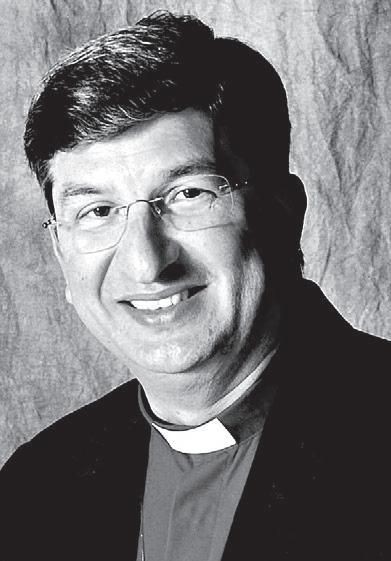
I welcome you in a special way as my brother. As a fellow Archbishop I hope we can cooperate in spreading the love of Christ among the people of Western Australia. As your predecessor worked closely with other Churches and with other Faiths both in the WA
Association of Heads of Churches and in other contexts, I assure you that you will receive a warm welcome from all of us.
You bring with you a number of special gifts. With your extensive experience in different countries and in a variety of pastoral settings you bring with you a concern for the poor and a history of advocacy for those who are denied basic human rights. You bring with you a love for the Sacred Liturgy as we experience it today, and a recognition of the importance of prayer and growth in holiness for all followers of Christ.
You also bring with you a commitment to ecumenism with your extensive contacts in many countries of the world. All these gifts will be warmly welcomed and received, as will your delight in good music and in sport which, as you would
know, is almost a religion here. The history of the Christian faith in this part of the world began with the arrival of the first Europeans when the Swan River Colony was established.
These people brought their Chaplains with them and, of course, their missionaries who reached out to the local Aboriginal people with good heart but perhaps with insufficient awareness of the strength of religious and social customs among the indigenous people. By 1858 there were two Bishops in Perth and two Cathedrals, whose bells rang out and continue to ring out, calling people to remember the presence of God and to deepen their knowledge and love of Jesus Christ and the discipleship of the Gospel.
The Churches of WA invite you, Archbishop Roger, to join with us in the increasingly urgent task of
speaking the knowledge and love of Christ and the supremacy of God in a culture that already exhibits the negative effects of secularisation and the marginalisation of religion. I have frequently called on Christian Churches to be one in fidelity to the Gospel in the face of a tide of secularisation, of materialism and of moral relativism that threatens society and its moral foundations. I repeat that call today. We must avoid the scandal of disunity about matters that are central to the message of Christ. We must be united in him to turn violence into peace, to turn hatred into love, to turn vengeance into forgiveness and injustice into respect for the dignity of every human being and of human life at all its stages, in order to build up the Kingdom of God.
May the Holy Spirit guide you safe.
Vatican official urges Church to jump into the web
If it is possible to find God on the Internet, then the Church has the obligation to proclaim him in that medium, says a Vatican official.
Archbishop John Foley, president of the Pontifical Council for Social Communications, told a meeting last week that the Internet can be a new path to God. “...a call to the Church to question itself on the opportunities offered by the new medium to inform, educate, pray and evangelise, to take the Word
of God everywhere, to reach also those who live in solitude and who perhaps would never open the door to their home.”
The archbishop made the comments when addressing a meeting in Rome on “Internet and the Catholic Church in Europe,” organised by Europe’s Bishops’ conferences.
The internet is “the Areopagus of our time, the instrument to spread the Christian message.”
“The Church, as transmitter of the Revelation of God, has the task
The Record
The Parish. The Nation. The World.
EDITOR
JOURNALISTS JAMIE O'BRIEN jamieob@therecord.com.au
BRONWEN CLUNE clune@therecord.com.au
MARK REIDY reidyrec@iinet.net.au
OFFICE
ADVERTISING
PRODUCTION
The Record
to communicate the Word and must encourage the use of the Internet for the common good, the development of peace and justice, in respect of personal dignity and with a spirit of solidarity,” he pointed out.
The internet is “the Areopagus of our time, the instrument to spread the Christian message,” Archbishop Foley said. “But it is necessary to educate in its use, as with every reality that surrounds us, the positive element is opposed to the negative, creating confusion and false values.
“Yes, God can be found on the network. And among the millions of people who surf the Internet every day, many may find words of
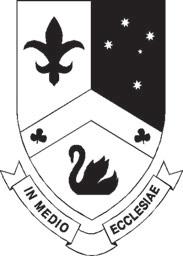




EUGENE SUARES administration@therecord.com.au inc. sales/subscriptions
MIZEN advertising@therecord.com.au
production@therecord.com.au
587
Fax: (08) 9227 7087
hope, come across other cultural and spiritual experiences, bringing down ideological barriers to discover new horizons.”
Yes, God can be found on the network. And among the millions of people who surf the Internet every day.
If “God continues to dialogue with humanity through the Church,” then “the Church must assume her own responsibility vis-à-vis the new means of communication,” the Vatican official said.
To accomplish this, he continued, there must be “precise criteria of discernment and a pedagogical intention, so that both those who operate in the sector as well as those who use the network are able to choose with maturity in an ever broader context of information and disinformation.”
Archbishop Foley added: “It is impossible to remain with one’s arms crossed contemplating this world that changes so rapidly; it is necessary to remember that God’s voice can be raised above many other voices, as he has always spoken to man and tries to reach him with all possible means, at times unimaginable.”




Page 2 June 16 2005, The Record
PETER ROSENGREN
Letters to: cathrec@iinet.net.au
MANAGER
CHRIS
MANAGER DEREK BOYLEN
Newcastle St, Leederville Post: PO Box 75, Leederville, WA 6902 Tel: (08) 9227
7080
is
dioceses
Western
Why not stay at STORMANSTON HOUSE 27 McLaren Street, North Sydney Restful & secure accommodation operated by the Sisters of Mercy, North Sydney. • Situated in the heart of North Sydney and short distance to the city • Rooms available with ensuite facility • Continental breakfast, tea/coffee making facilities & television • Separate lounge/dining room, kitchen & laundry • Private off-street parking Contact: Phone: 0418 650 661 or email: nsstorm@tpg.com.au VISITING SYDNEY A LIFE OF PRAYER ... are you called to the Benedictine life of divine praise and eucharistic prayer for the Church? Contact the: Rev Mother Cyril, OSB, Tyburn Priory, 325 Garfield Road, Riverstone, NSW 2765 www.tyburnconvent.org.uk TYBURN NUNS Year of the Eucharist Holy Hour Exposition, Vespers & Benediction Sunday evenings 6.30pm – 7.30pm St Joseph’s Priory Church Treasure Road Queens Park Holy Hour Norbertine Canons The Parish. The Nation. The World. Psychological Counselling and Spiritual Direction Patrick Jones - B. Theol., B. Psych. 10 years experience 1/2 hour complimentary assessment Bookings 9316 9111 ® A division of Interworld Travel Pty Ltd Lic No.9TA796 Est 1981 200 ST.GEORGE’S TERRACE,PERTH,WA 6000 TEL 61+8+9322 2914 FAX 61+8+9322 2915 email:admin@flightworld.com.au www.flightworld.com.au Michael Deering Visit a holy place or shrine and experience the enrichment of spirituality. Book with WA’s most experienced pilgrimage travel agency. AGENT FOR HARVEST PILGRIMAGES. Reaffirm your faith Reaffirm your faith Enquire about our Cashback Offer* * Conditions apply
a weekly publication distributed through parishes of the
of
Australia and by subscription.
Anglican Archbishop Roger Herft
Catholic Mission: drop the Corby-
Tsunami aid is for keeps says the head of the Australian Catholic Church’s mission agency
Calls for Australia to take tsunami aid back from Indonesia in the wake of the Schapelle Corby verdict were terribly misguided, Catholic Mission National Director Father Terry Bell said.
Father Terry said he was heartened to report that not a single donor to Catholic Mission, the Church’s global mission aid agency, had asked for their money to be refunded.
Catholic Mission established a special Tsunami Solidarity Fund following the Boxing Day tragedy last year.
Approximately $200,000 was collected and is being used for urgent projects in affected areas including trauma counselling for families, milk powder for infants and desks and equipment for school children.
Indonesia, India and Sri Lanka will continue to benefit from Catholic Mission funding in future.
Separate to the tsunami response, Catholic Mission donated nearly $100,000 for needy children in two dioceses in Indonesia in 2004.
Father Terry said the linking of foreign aid with the Corby case was illogical and absolutely contrary to the compassionate example embodied by Jesus Christ.
“It saddens me to think that Australians would even think of denying a hungry child food or a destitute family a roof over its head because an Australian woman has been convicted, rightly or wrongly, of drug smuggling,” he said.
“It was so wonderful to see that philanthropic vein opened in so many Australians after the tsunami and a growing awareness of a responsibility for our brothers and sisters in other parts of the world.
“The response now that we should take back some of the support given is frankly, mean.
“I’m so very encouraged that Australian Catholics have seen beyond the media hype and continue to support the people of the developing world.”
Overseas aid organisations such as Catholic Mission, which raised a record $8.1 million in net donations in Australia last year, were in a unique position to keep people connected with the rest of the world.
“This connection discourages racism and promotes a greater understanding between cultures,” Father Terry said.

Healing an experience
■ By Clare Pike
The first Project Rachel Ministry retreat for Western Australia took place last weekend at the Redemptorist Monastery Retreat Centre in North Perth.
The team who administer the healing sessions comprise Fr Anthony Van Dyke OP, psychotherapist Leonie Palmer, Respect Life Officer Clare Pike and Director of Project Rachel in Australia Julie Kelly.
The first Rachel’s Vineyard Retreat in Australia took place in December 2000 and while this was the 19th retreat that Mrs Cook had organised, it was the first time it was being run in Western Australia. Seven women arrived last Monday afternoon after courageously conquering both the weather and their own worries and fears, to undergo an experience of healing they would never forget.
The group consisted of five Catholics, a Protestant and a Buddhist woman who all had the traumatic experience of abortion in common.
At the commencement of the retreat some of the participants shared their fears of judgment and apprehension about the retreat.
It quickly became clear that this was a safe place where each person could relax and be themselves. Leaving behind any stresses of family or work life, each person was able to take a deep breath and begin to allow the pain of their past to surface, be validated and processed.
The retreat included living scripture exercises, where biblical stories were used to help participants enter into a particular scene (such as John 11:1-44) and come to understand how Jesus was approaching them individually with a personal
message. It was a powerful form of communication and healing. Each woman was also given an opportunity to share her story and receive the support and affirmation of the rest of the group afterwards. There was an opportunity for some women to experience psychodrama and various rituals were used over the couple of days.
The retreat enabled the women to open their hearts, to connect with their child/children (which included naming them and writing a letter to them - there were 16 in total), and then to say goodbye and let them go. Through the Sacraments of the Annointing of the Sick and Reconciliation each woman was able to experience the mercy and forgiveness of God and to forgive herself.
It is impossible to adequately describe the treasure that was given to each person who attended this retreat. But I must say that I personally was profoundly affected by attending. After experiencing the depth of love that each person poured out and received, I have a new understanding of God’s love. One of the women summarised her
experience as follows. “The retreat expanded my perception of myself and helped me put my life into perspective. It has released me from my self-hatred and gave me hope for my future.”
“What I found most meaningful was the storytelling and constant love and support.”
These women will continue to meet and receive the support needed to continue along the journey which has begun. In addition to the great gift that each woman received, this retreat was a sign of great hope for everyone in the Perth diocese because this group of extraordinary women now feels empowered to make a difference in the lives of others who have been hurt by abortion.
We are confident that the support we have received will continue and there will be another Rachel’s Vineyard Retreat before the end of the year.
In the words of Henri Nouwen, we can ultimately find a healing that lets our wounded spirits dance again, that lets them dance unafraid of suffering and even death because we learn to live with lasting hope.
Deep healing was experienced by participants:
● “The enormous release of 30 years of suppressed pain and the honesty to oneself. The letting go and finding forgiveness, the new beginning. It was excellent.”
● “Very spiritual and professional - was more then I could believe. Meeting my sadness head-on with the comfort of professional support, and the support from all.”
● “I found my babies, and then I could give them to God. I found peace.”
● “I am definitely in a better place for it. I feel sorry for all those women out there if they haven’t had this opportunity. It was good to hear everyones story and know that I am not alone and that abortion is not an insignificant event.”
in brief Bishops warn on persecution
OTTAWA (CNS) - Calgary
Bishop Fred Henry warned of a growing religious intolerance in Canada when he appeared as a witness before the legislative committee studying same-sex marriage on June 6.
“We’re into a changed social reality that is hostile to religious belief,” Bishop Henry said, citing a threatening phone call from Revenue Canada and two recent human rights complaints against him for his opposition to gay marriage as threats to his freedom of expression and religion belief.
“These complaints are an attempt to intimidate and silence me and are without any foundation in fact,” Bishop Henry said. The bishop began his presentation with a critique of Foreign Affairs Minister Pierre Pettigrew’s recent statement about the separation of
church and state that was interpreted by journalists to mean that the Church should stay out of the debate on civil marriage.
Jews not worried
When recent headlines announced that Pope Benedict XVI had once been enrolled in the Hitler Youth, Jewish leaders who knew the new pope were not overly concerned. In the days after the pope’s April 19 election, Ambassador Oded Ben-Hur said he asked Jewish audiences “to be patient, to not pass hasty judgments.” Ben-Hur, Israel’s ambassador to the Vatican, was optimistic because he was familiar with the new pontiff’s track record as head of the Congregation for the Doctrine of the Faith. Former Cardinal Joseph Ratzinger wrote extensively about the importance of the Hebrew Scriptures for Christian faith and the ongoing mission of the Jews in God’s plan of salvation for humanity. - CNS

June 16 2005, The Record Page 3 Property Management Service For honest, reliable service and care of your investment property. Contact (08) 9459 3600 or email Trish Humphries at trish@ppre.net www.ppre.net
aid link
Children devastated by the Asian tsunami will continue to receive aid from Catholic Mission, thanks to generous Australian donors.
Caritas promotes work, new program
■ By Jamie O’Brien
Numerous Perth businessmen and women gathered at the Perth Zoo Function Centre last week to hear how the enormous generosity of people has helped the people who suffered the Asian tsunami disaster on December 26 last year.
The breakfast was also an opportunity for Caritas to thank all those involved in raising the more-than $20 million for the tsunami-affected areas.
The money will be used for both immediate relief and long term building in Indonesia, Sri Lanka, India and Thailand. Much of this work includes providing clean water and sanitation, psycho-social support, livelihood restoration, construction of permanent shelters and educational assistance.
During the breakfast, Perth archdiocesan Global Education Adviser Janine Murphy told of some of the experiences of the people in these areas.
“Some people are shocked when they know the Australian public give money,” Ms Murphy said.
“We tell them it is just the ordinary
people that support us and they pass on their thanks,” she said.
The early-morning event was also the occasion to promote Caritas Australia’s Think Globally, Act Locally campaign, a three-phase initiative, which involves participants studying global development issues in the light of the Church’s teaching.
The study course involves set readings, group discussion and some exposure to situations of poverty and injustice in the local scene.
The course has been given full status at Notre Dame University and can be used for accreditation for teachers through the Catholic Education Office.
In the second phase of the program participants also have the chance to experience life in a Caritas-partner country for two weeks.
The third stage of the program involves participants working in justice and peace-related areas at the local level through the Caritas network.
The tsunami appeal is now closed. However donors are encouraged to support the tsunami victims through Project Compassion.
For more information about the work of Caritas call (08) 9422 7925.
Dancers hit streets
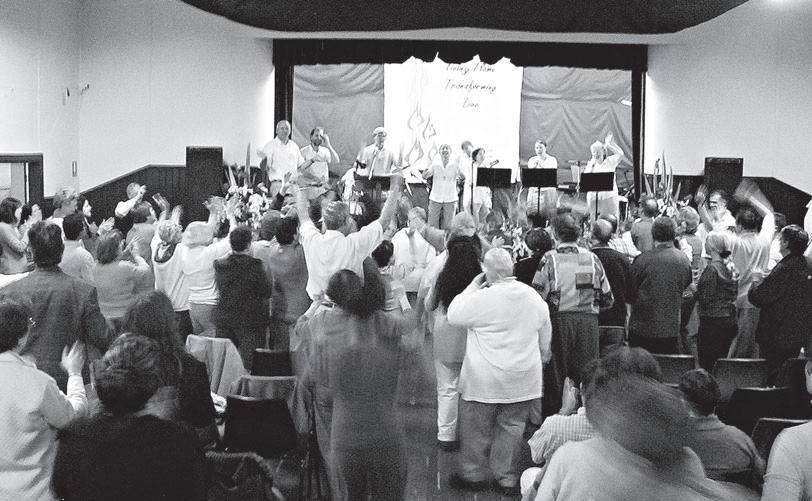
Joy-filled and dancing conference participants spilled out into the streets of Pemberton during the Holy Spirit of Freedom Community’s annual conference on June 4.
Over 180 people attended the weekend conference, entitled, “Living Flame, Transforming Love”, which emphasised the need for a total surrender to God’s Spirit and love.
The theme reached a climax on Saturday night when dancing and singing participants who had been involved in praise and worship spilled out of the town’s Mill Hall.
On Friday evening and throughout Saturday participants heard a number of talks given by Community co-leader, Josephine Bendotti and founder Deacon Frank Feain.
The speakers emphasised that Christians need to allow themselves to be refined in their lives by the fire of God’s love in order to be drawn into a deeper relationship with Him.
Testimonies shared by HSOF members Bill and Jennifer Bellair emphasised that while such purification can entail a degree of suffering the ultimate reward comes through a genuine relationship with Jesus.
Mrs Bendotti spoke of the ‘casing’ that many people erect around
their hearts as a response to past hurts.
“These wounds will continue to fester until they are exposed to the love of God,” she said. “This is why we have such a hurting and hardened world. We need to reach out to one another”. Participants were encouraged, through prayer, praise and worship, to relinquish control of their hearts to God and to be open to receiving His love.
Only then, they were told, could they develop a healthy love of themselves and in turn share this love with others.
The Community’s call to reach out to those on the streets was spoken of by Melbourne leader Margaret Trainor and founding member Elena Reidy, who shared their experiences of working with those trapped in lives of addiction and self harm.
“As Christians we are called to be the ‘yeast’ in the ‘bread’ of our society”, said Mrs Reidy. “We need to permeate the darkness and pain of the world with the light and love of Christ.”
The weekend concluded with Mass concelebrated by Fathers Ed Stewart, Brian Morgan and Wahid Riad (Melbourne) who urged conference participants to go out and share God’s love with everyone they meet.
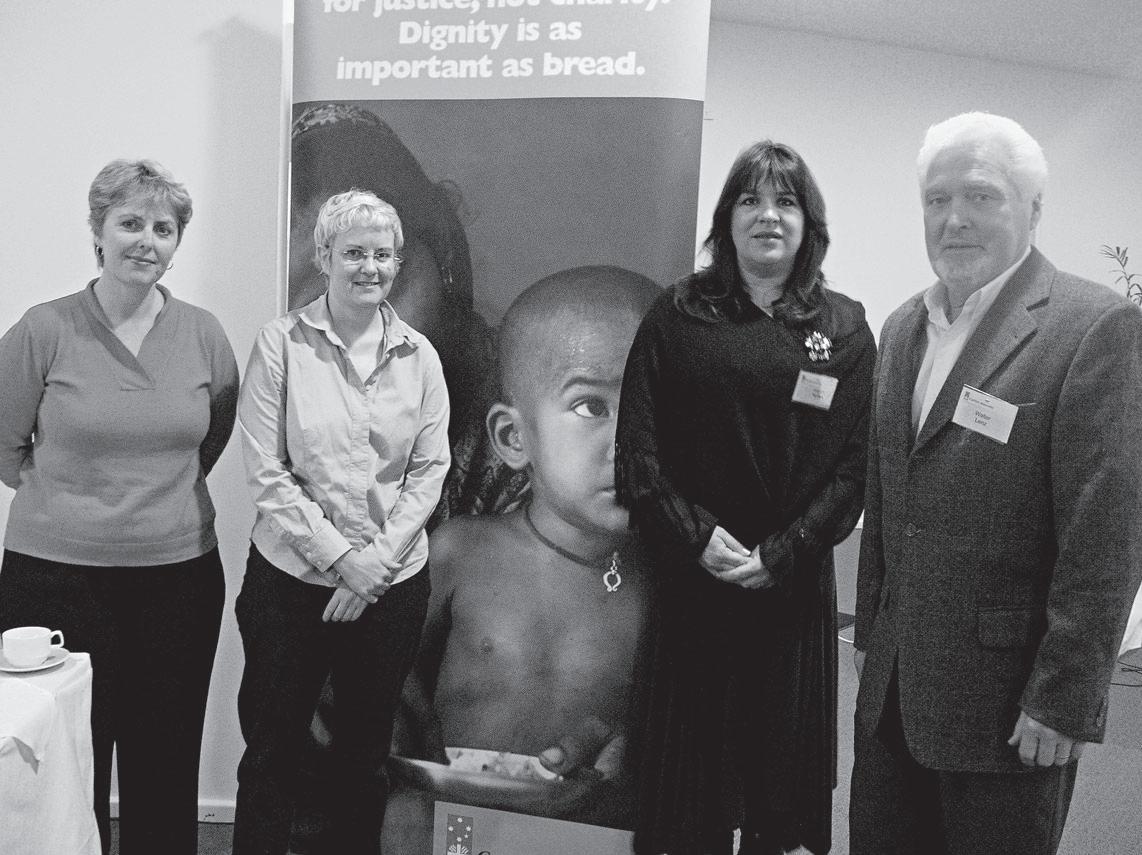
Eucharist turnout pleases priest
■ By Mark Reidy
The visual appearance of bread and wine does not limit the eternal significance of the Eucharist, Fr John Daly told over 60 people at the St Thomas More parish in Bateman on May 25.
Fr Daly’s talk on the Real Presence of Jesus in the Eucharist was part of a Parish initiative to celebrate the Feast of Corpus Christi
as well as addressing issues of faith. Fr Daly traced the spiritual understanding of the Body and Blood from the early Church through the Councils of Nicea (325) and Trent (1545) to the impact of the Second Vatican Council. Drawing on the reflections of, among others, the 13th century Doctor of the Church, St Thomas Aquinas, Fr Daly emphasised the mystery of faith that is associated with the Eucharist and acknowledged that even priests could find
it difficult to step outside the mundane and into the sacred during each Mass. He supported Pope John Paul II’s encouragement to Catholics to contemplate these mysteries through Eucharistic Adoration.
“It is an opportunity to sit still in the presence of God”, he said.
Fr Daly said he was delighted and surprised by the attendance at the conference and hoped that the presentation would help generate a deeper love for the Eucharist.
Divorce victims remain faithful
Aseparated 62-year-old Italian mother has created a threestep process in her country for other Catholics who struggle after parting from their spouses.
“Reconstruction of the person who lives acutely the suffering of rejection, forgiveness of the spouse, and renewal of the marital ‘yes’ to God,” are the stages of the spiritual journey undertaken by members of a group called Saint Mary of Cana, according to its coordinator, Maria Pia Campanella.
The group for divorced spouses faithful to the sacrament of marriage was established by Auxiliary Bishop Salvatore Di Cristina because the topic of pastoral care for those who decide not to enter a new relationship after divorce “is never spoken about with ease,” she observed.
The group is comprised of separated persons who remain faithful to the marital bond.
Campanella’s local diocesan Commission for Family Pastoral Care is responsible for supporting these separated faithful who are not living with someone else and who seek a spiritual program that includes faithfulness to marital indissolubility and the sacrament they once received.
Campanella recently organised a Day of Reflection and Prayer, which concluded with a Mass and
the “renewal of the yes,” reported the Italian newspaper Avvenire
Ongoing sanctification
Pasquale Chiancone, director of the diocesan Centre for Family Pastoral Care, explained: “Although a couple is separated, the indissolubility gives the faithful spouse the necessary grace to continue to fulfill the mission of marriage: one’s own sanctification and that of one’s spouse.”
It was the goal of Campanella, who over the last few years has travelled around Italy and abroad to study what the Church proposes to those who are separated and who do not intend to start living with someone else.
“I have been married since 1968 and have been separated from my husband since 1990,” said the retired teacher, who has three adult children.
“Despite the great sorrow, I understood immediately that I would not try to ‘remake my life,’ as the saying goes. However, I wanted to know the meaning of my suffering.”
“What has really sustained me is daily Mass, the Word of God read every day, and personal prayer which I raise to God from my wounded heart. To this I have added reading of the documents of the Church on marriage, trying to
understand the meaning of indissolubility in conjugal separation.”
Seeking a specific program, Campanella realised that pastoral care for the separated was almost never geared to helping those who do not remarry, and virtually never offered meditations on the sacrament of marriage.
“The group does not meet only to pray, but tries to appreciate the sacrament of marriage and reflect further on the meaning of indissolubility in the situation of conjugal separation.
“The stages of the journey are the reconstruction of the person who lives acutely the suffering of rejection, forgiveness of the spouse, and renewal of the marital ‘yes’ to God. The wound is there, but it is important that it not become a plague or gangrene.”
Bishop Di Cristina, who guides the group, said: “These persons must be helped and introduced into community life.
“This program of spirituality is interesting so that those who take part in it can support one another in consolation.
“Theirs is a communion of hope, almost a vocation within the marriage vocation. It is the demonstration that the sacrament of marriage is lasting, because it reflects God’s faithfulness, who never regrets the love he gives.” - Zenit
Page 4 June 16 2005, The Record
Caritas representatives Janine Murphy and Justine McMahon, with friends of Caritas Angela Nutton and Walter Lenz.
Photo: Jamie O’Brien
Participants at the Holy Spirit of Freedom annual Conference in Pemberton on June 4.
Ads remind all of God’s love
Archbishop Barry Hickey ran a half page advertisement in The West Australian last Friday (see illustration below) and Saturday reminding faraway Catholics that God loves them and the Church loves them, and inviting them to return to their spiritual home.
The Archbishop said this week that the advertisment provoked a lot of comment, much of it from the media who were fascinated by the Church entering into the marketing business by advertising for customers.
“It was not a marketing exercise at all,” the Archbishop explained.
“We had a genuine concern for the spiritual welfare of faraway Catholics as well as a desire to address grievances if they would let us know.
“The ad was the topic of conversation around the Diocese. Wherever I went it was being discussed, mostly in positive terms.


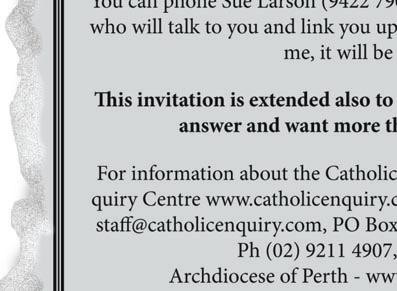
“We were discussed on radio and television and even rated a mention in the editorial of The West Australian last Tuesday. We do not know what the outcome is yet. We do not know how many people accessed the suggested websites or contacted parish priests, or will do in the future.
“What is instructive for us is the realisation that ads in the local paper have a significant impact. People notice them.
“I thank the generous donor who made the adverts possible by offering to pay for them.”
Sue Larsen, the promoter and organiser of the Rite of Christian Initiation of Adults (RCIA) was nominated in the newspaper advertisements as a point of contact in addition to Catholic friends and Parish Priests. She said there were not a great number of calls on the first few days, but it was important that people had an immediate point of contact
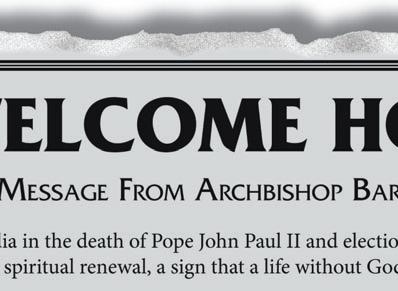
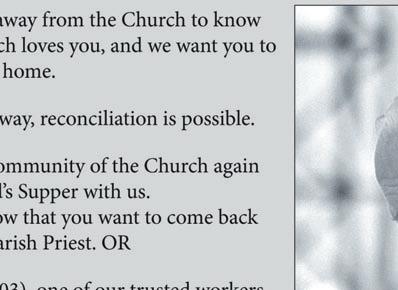

Benedict no sound-bite Pope
VATICAN CITY (CNS) - When Pope Benedict XVI weighed in on pro-life and family issues recently he did so in a way that offers clues to the style and substance of his still-young papacy. Media reported the Pope’s June 6 talk to the Diocese of Rome as no less than a declaration of war against gay marriage, abortion and birth control. Newspapers plucked out phrases like “anarchic” and “pseudo-marriages”
where people could express their views.
Some callers described why they had left the Church and why they would not return, and it was important that they be heard and their grievances understood and dealt with where possible.
Others wanted to commend priests whose kindness and consideration had influenced their return to the Church.
Fr Larry Reitmeyer, of Myaree, and Frs Joseph Tranh and Benedict, both of Whitford, were the first to be mentioned. This week, media packs from the Australian Bishops Media Committee were distributed to all parishes. The packs include advice on how to promote the good news associated with the Church to the media, particularly local media.
They include advice on establishing good relationships with local editors and journalists, and understanding their requirements for good news stories.

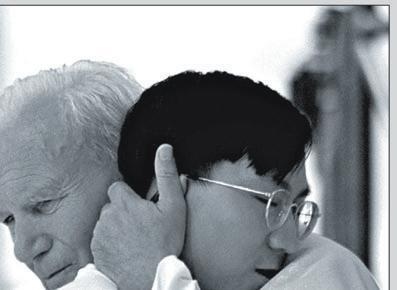
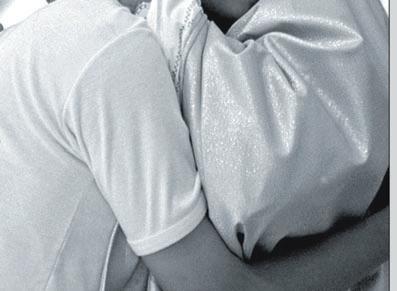
for some zinger headlines. But that’s one of the problems with Pope Benedict: Often, his well-reasoned discourses don’t break down easily into sound bites and headlines. As one veteran wire service reporter recently lamented in the Vatican press office, the new Pope is hard to write about because short citations don’t do justice to his complex arguments. You can’t just cherry-pick quotes. That was especially true when the Pope spoke about the family to a packed Basilica of St John Lateran. His 3,000-word speech was a seminar, not a tirade.
When I am not able to receive my Lord, I go into the church and there I look at Him . . . I look at Him again . . . and this satisfies me.
– St Catherine of Siena
Jesus’ visit to me in Holy Communion gives me the desire and strength to offer myself as a sacrifice, when I feel all alone and in pain.
– St Bernadette of Lourdes

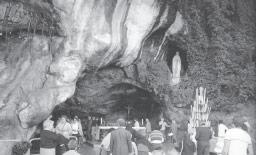
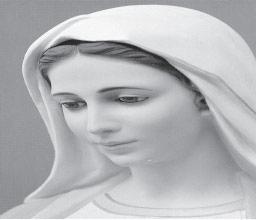
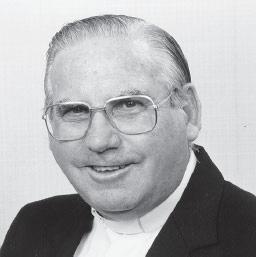

PILGRIM’S
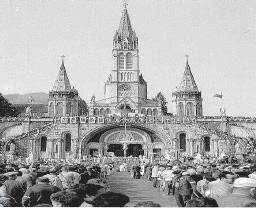
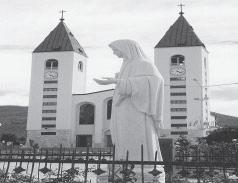
LINDA’S HOUSE OF HOPE NEEDS YOUR HELP
Your valuable and vital support is much needed to ensure we can continue providing care and assistance to women and their families who have been degraded and damaged by prostitution.
Linda’s House of Hope is in desperate need of a total and complete renovation to the shelter, to be able to keep providing assistance and safety to these women. Your precious funds would enable us to renovate the bathrooms and other major work that is needed throughout the house.
On behalf of the girls that will directly benefit from your donation, I thank you for supporting the House of Hope.
- Linda Watson
Linda’s House of Hope, Ph 9358 2544.
PO Box Z5640, St George’s Terrace, Perth 6831.
(All donations over $2 are tax deductable)
“The Lord says I will bring my people back to me, I will love them with all my heart” Hosea 14:4
June 16 2005, The Record Page 5 Flightworld Travel Perth (08) 9322 2914 Travelscene Lords (08) 9443 6266 FREE CALL 1800 819 156 Lic. 2TA 003632 HARVEST PILGRIMAGE S Rome (3 nights) Medjugorje (7 nights) Visit this village of grace and peace where itís reported Our Lady still appears daily. MEDJUGORJE Departing 27 July, 8 September, 8 October and 30 October 2005. Medjugorje only option also available from $2895 $3490 from CATHOLIC HEARTLAND Czestochowa • Auschwitz • Wadowice Krakow • Prague • St Petersburg Optional Moscow Extension A 14 day pilgrimage Departs 16 Sept Optional link to Irish Heartland $5095 priced at $3795 from RETURN TO THE HOLY LAND (price ex-Sydney) Pope John Paul II encouraged ìpilgrimages of peace to the Holy Land... I encourage it with all my heartî. Cairo • Mount Sinai • Petra Amman • Sea of Galilee • 13 days Optional Jerusalem extension (4) Departing 15 Sept with Bishop John Gerry and 17 Oct 2005 All prices listed do not include taxes VISITATIONS OF MARY Lisbon • Fatima Anniversary Avila • Burgos • Garabandal • Loyola Lourdes • 13 days Departs 10 September & 10 October 2005. $4495 from Optional Medjugorje Extension Australiaís most popular Marian journey.
Year of the Eucharist
ROAD Lourdes • Loyola • Santo Domingo de Silos • Burgos • Leon • Astorga Santiago de Compostela • Fatima Departs 18 October 2005 $4295 priced at Join a centuries old tradition along the pilgrimís path.
Around t he tabl e dnuorA t eh lbat
Sisters key in vocation work
Among the very interesting feedback to the Bishops from young people reported in The Record (June 2) there is a strange comment concerning the alleged lack of support on the part of religious Sisters for young women considering religious life. It struck me as strange because since returning to the Diocese three and a half years ago I have been much impressed by the energy and the hopefulness of the Sisters I have come across as they look forward to new challenges and new work. And it is certainly the Sisters in this State and across the country who are the driving force behind the Catholic Vocations Ministry, which holds regular consultations and conferences, tracks and encourages State programs and initiatives, and issues a particularly fine and comprehensive Newsletter four times a year.
I had the privilege three weeks ago to be involved in an evening
with about 30 young people who had gathered in a suburban parish to reflect on this very topic – vocations to priesthood, religious and married life. It was a refreshing and stimulating experience, during which three young Sisters (all under 35!) from three different congregations offered their experiences and stories to an attentive and appreciative audience. Their presentations were quite remarkable, in fact, and no one could have left the evening unmoved. There must have also been at least 12 or 15 Sisters present from maybe 7 or 8 different Congregations, all there because they are involved in their own respective vocations programmes - clearly bearing fruit, judging by the young religious who had come along to speak to the young people.
I find all this very hard to reconcile with the statement from an anonymous young delegate to the youth consultation with the Bishops that there is a perceived lack of support in the vocations field from Religious Sisters. Maybe she is unaware of all the work going on quietly, but clearly with some effect. It strikes me as an extraordinary idea - and an insensitive injustice to the Sisters themselves – to think of directing young women on their search away from the obvious starting point of any religious vocation, as was hinted at in the Record article. Surely the only place to start on the great quest which is a religious vocation is with the actual Congregations themselves? Where else? They are certainly ready for that task.
(Fr) Michael Leek OSB North Beach
Concert to aid Vinnies
■ By Kate Selth
Internationally acclaimed organ virtuoso Thomas Heywood will perform a benefit concert for the St Vincent de Paul Society Winter Appeal on Saturday July 2, 2005.
Thomas Heywood’s Grand Organ Gala, presented by Organ Concerts Australia, will be held at St Thomas the Apostle Church in Claremont.
The church’s J.E Dodd pipe organ dates to 1912 and has the traditional tubular pneumatic action preserved as it was installed in the Methodist Church, Parkside, S.A.
Claremont Parish Priest Fr Brian O’Loughlin said that Thomas Heywood’s local concert had the distinction of playing the organ in its original setting.
“St Thomas’ has hosted many concerts since the arrival of the organ in 2003. The churches’ acoustics have attracted the Collegium Symphonic Chorus and the Allegri Chamber Orchestra to give performances,” said Father O’Loughlin.
Heywood is renowned for his unique ability to make great music come alive and his international solo concert tours in the USA and Europe received record crowds and standing ovations.
St Vinnies State President Brian Bull encourages community members to come along to enjoy a dazzling night of musical masterpiece, while raising money for people in need this winter.
“We are privileged to have a musician of Thomas Heywood’s calibre supporting St Vinnies and we hope many people come along to make the concert a huge fundraising success,” said Mr Bull.
Thomas Heywood’s Grand Organ Gala Concert details:
Date: Saturday July 2, 2005
Times: 8.00pm
Place: St Thomas the Apostle Church 2 College Road (cnr Melville Street) Claremont
Cost: $20 adult, $15 concession, under 12 free.
Tickets: Call St Vinnies on 9475 5400 or purchase at the door.
Social justice lecture
■ By Jennifer Wakeman
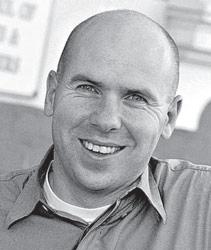 Dr Simon Adams
Dr Simon Adams
The WA College of Community Psychologists, in conjunction with The University of Notre Dame Australia’s School of Behavioural Science is holding a public lecture by Dr Simon Adams titled, “Creating connections between the rhetoric and reality of teaching social justice.”
Dr Adams is the Dean of the College of Arts and also lectures in social justice, politics, and history at Notre Dame’s Fremantle Campus.
His previous teaching programs have included taking students to East Timor to experience first hand
the rigours of rebuilding a country devastated by years of war and occupation. Dr Adams’ lecture will provide insight into how he established this and other programs and the benefits derived from such an experience for students.
“Notre Dame has a strong commitment to fostering the ethical development of our students, alongside their professional and intellectual development. I believe our teaching not only helps students understand the world we live in, but inspires them to help change it.
“The learning experiences I have shared with my students on the many field trips I have been involved in, including those to East Timor, have been extremely rewarding,” he said. Dr Adams was educated at the University of New South Wales in Sydney. While undertaking PhD research in 1995, Dr Adams was attached to the University of the
Prelate condemns Mugabe’s demolition of squatter homes
Continued from Page 1
in Zimbabwe, we felt that it was really inconsiderate. Now people are sleeping in the open; there are small children there.”
Opposition politicians of the Movement for Democratic Change said Mugabe has reneged on promises to find new homes for those he has evicted.
They accused Mugabe of seeking to punish the urban poor who voted against the ruling ZanuPF party in March parliamentary elections.
The words of Archbishop Ndlovu carry weight because he has been reluctant to involve himself in the political life of the former British colony.
Archbishop Pius Ncube of Bulawayo, Zimbabwe, has regularly criticised Mugabe and his policies, accusing the president of causing spiraling unemploy-
ment and hunger in a land once regarded as the “breadbasket” of sub-Saharan Africa.
Since his August 21 installation in Harare, Archbishop Ndlovu has adopted a softer approach to avoid being identified with any particular political cause.
Like Archbishop Ncube, Archbishop Ndlovu is from the minority Ndebele tribe. Most Zimbabweans are from the majority Shona ethnic group.
Mugabe, who has ruled the southern African country since it won independence from Britain in 1980, is widely blamed for mismanaging the economy. Zimbabwe has more than 70 percent unemployment; while official figures put inflation at 300 percent, unofficial estimates put it closer to 600 percent. Aid agencies say food shortages are likely to affect more than 2 million of Zimbabwe’s 11.6 million people this year. -CNS
Witwatersrand in South Africa, where he worked with former political prisoners in Soweto.
A specialist in Australian and Irish history, as well as terrorism and international political conflict, Dr Adams has published academic work in all these areas. In July 2000 Dr Adams was the first Australian to be invited to act as an International Peace Observer in Northern Ireland. Dr Adams is also a political commentator on ABC radio and writes regularly for newspapers and magazines.
He has authored three books including his most recent, All the Troubles: Terrorism, War & the World After 9/11
The lecture will be held on Tuesday, 21 June at 5.30pm at Notre Dame, Fremantle.
For further information, please contact Dawn Darlaston-Jones on 08 9433 0567 or ddarlaston-jones@nd.edu.au
Parish pistol
A Catholic parish in the western coastal city of Mumbai received a pistol in one of its collection boxes in place of the cash or other valuables usually donated by parishioners. The pistol is believed to have been dropped off on June 8 at St Michael’s Church following a novena prayer service to the church’s patron. Church workers found the pistol on June 9.
“I handled it very carefully as I was worried it might go off and handed it over to our supervisor who handed it over to the police,” Raju Londhe told CNS.
Londhe said all three offering boxes - one for cash and the other two for candles, garlands and coconuts - are emptied every Thursday morning as many Christians, Hindus and Muslims come to the church on Wednesdays seeking blessings and favours from St. Michael.
Auxiliary Bishop Percival Fernandez of Mumbai said people were guessing that someone dropped the pistol because of “conversion of the heart.” - CNS
Priests’ references key for enrolment
Continued from Page 1
entails how long the priest had known the student, how the family was involved in the parish and what pastoral reasons there were for recommending the student.
Previously, the policy for priority acceptance into a Catholic School was Catholic students from the parish, Catholic students from outside the parish, followed by non-Catholic siblings, other nonCatholic Christians and finally nonCatholics.
However the policy now gives priority to Catholic students from the parish with a reference from their parish priest, Catholic students from outside the parish with a parish priest reference, other Catholic students from the parish and other Catholic students from outside the parish, siblings of non-Catholic students and other non-Catholic students from Christian denominations and other non-Catholic students.
However the reference does not automatically guarantee students will be accepted into the school,
Join Pope Benedict XVI in prayer - June
even if they are living in the parish.
Each school has its own enrolment policy and the reference is not the only source taken into consideration.
“In the end it’s a principal’s decision as to who enrols in the school,” Mr Dullard said.
“Many Catholics are not part of their parish and don’t know their parish priest.”
Mr Dullard said the policy is really focussed on parents.
“It’s really putting the onus on parents to see where they sit in terms of the enrolment policy.”
“For the millions of refugees in the world: may they receive brotherly love and concrete aid from all Christians.”
Mission intention: “For Christians: may they come to an ever deeper realisation that the Most Holy Eucharist is the pulsing heart of the Church.”
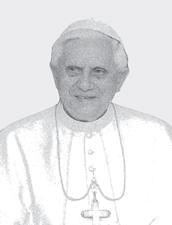
Page 6 June 16 2005, The Record
e LETTERS TO THE EDITOR letter to the editor
The neglected Vatican Beat
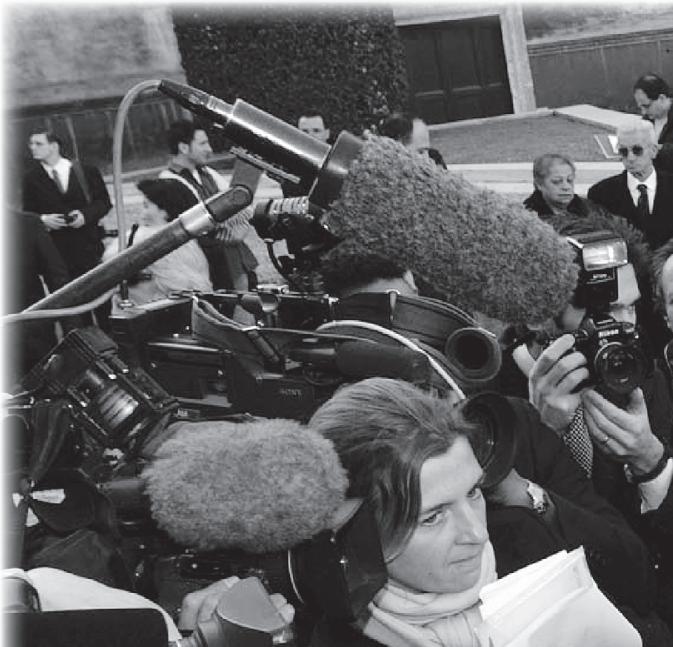
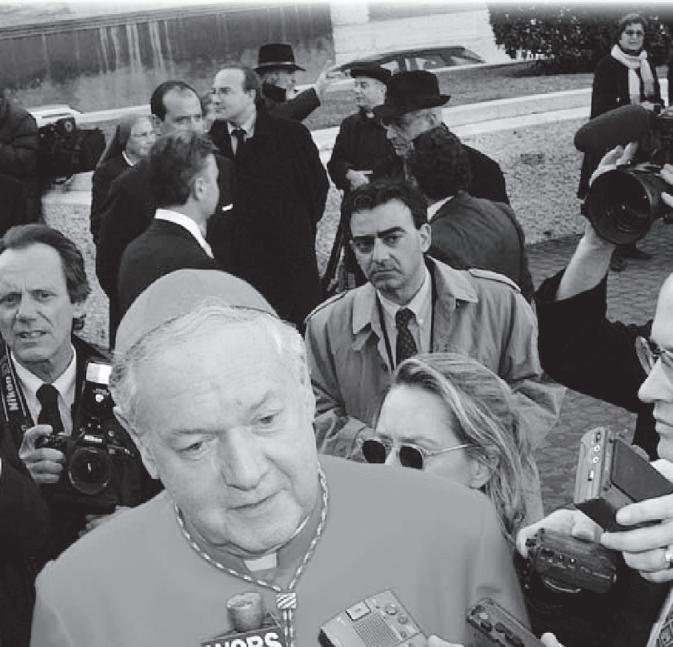
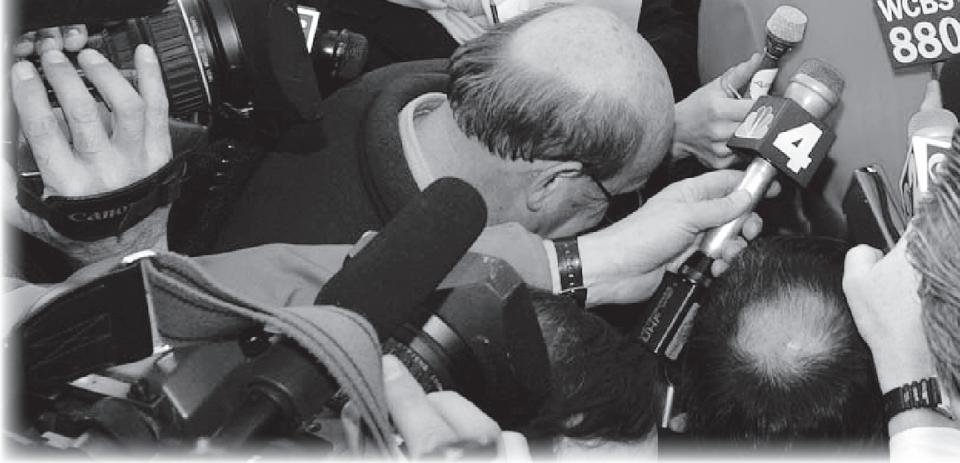

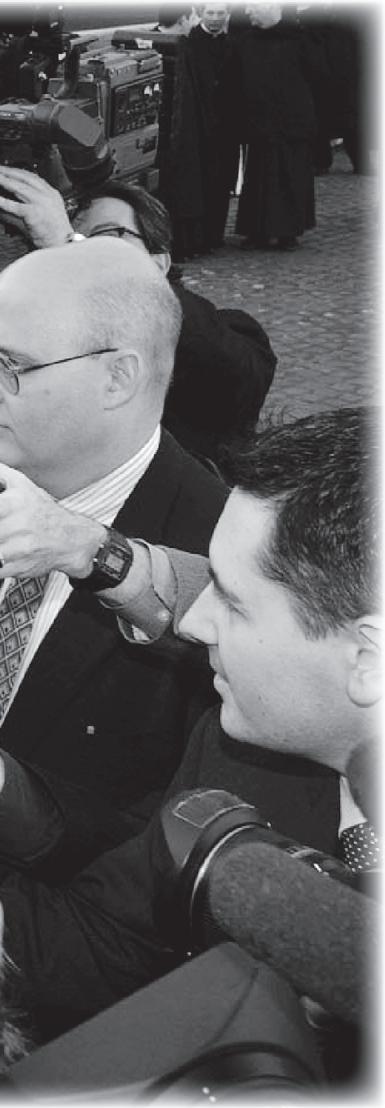
‘. . . most reporters are constrained to do less than full-time work on a beat that demands more than full-time competence.’
■ By John Allen
With few exceptions, Englishlanguage journalism doesn’t take the Vatican terribly seriously.
The Vatican press office accredits dozens of English-speaking Rome-based reporters, but most of them spend perhaps 25 per cent of their time on the beat. A typical correspondent for an American or British media outlet is also likely to be responsible for European politics, business and culture, as well as the southern Mediterranean and the Balkans. At the time, several Rome-based correspondents were deployed to cover the possible war in Iraq. The Rome bureau chief for CNN, for example, spent several weeks in Kuwait.
It’s not that the Vatican doesn’t merit coverage. The Pope sets the spiritual and moral tone for one billion Catholics scattered in every corner of the globe, and the Vatican is an influential player in the critical political or cultural debates of the day, from the Middle East to cloning.
Yet full-time English-language reporters on the Vatican beat can be counted on two hands. The Associated Press and Reuters each have a Vatican writer, and Newsweek has a part-time correspondent whose primary interest is the Vatican. In the “trade press” of specialised Catholic news organisa-
tions, there are perhaps five or six full-time Vatican English-language correspondents.
The inevitable result of this neglect is that much reporting is superficial, driven by stereotypes and conventional wisdom. During 2003, this weakness showed up repeatedly as the American press too often missed the context necessary to account for developments in the emerging sexual abuse crisis. An example of this occurred in the reporting about the policy adopted by the US bishops in Dallas; those who cover the Vatican knew it wouldn’t be accepted. Since the mid-1980’s, Vatican officials have repeatedly insisted on using Church courts rather than a bishop’s administrative authority to remove priests from the ministry. More informed reporting would have prepared the public for what was likely to happen. Instead, most American news media outlets appeared to be blindsided by the Vatican reaction and, at least initially, they insisted on treating it as another example of “conservative Vatican vs. independent-minded American Church.” (In fact, often the more liberal bishops and canon lawyers in the United States were the ones who hoped the Vatican would demand changes towards greater due process for accused priests.)
Challenges on the Vatican Beat
The greatest challenge I have as a Vatican correspondent is cutting through popular misconcep-
tions that are reinforced by careless reporting. These misconceptions include:
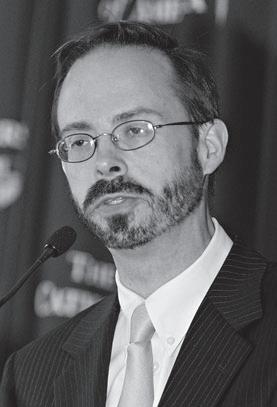
Allen
Vatican “secrecy”: Few stereotypes are more enduring. Consider this lead from a story about the sex abuse scandals that appeared above the fold on the front page of a major American daily: “The sense of impenetrability begins at the Vatican gate just beyond St Peter’s Square. Swiss Guards . . . lift their pikes to allow passage only after receiving orders. Farther inside, a gatekeeper checks his list before giving a reluctant nod for a visitor to enter a 12-foot door reinforced with steel and iron spikes to repel invaders . . . . Inside the fortress-like building, an air of secrecy and monarchical power wafts through elegant, marble halls like a thick plume of incense.”
Such imagery may make copyeditors salivate, but the truth about the Vatican is far more prosaic. The Swiss Guards are indeed colourful, but they’re no more adept at managing the information flow than Enron’s security force. As with any other
Continued inside
Vista June 16 2005 Page 1
John
A Church official fronts the media
Photo: CNS
The neglected Vatican beat
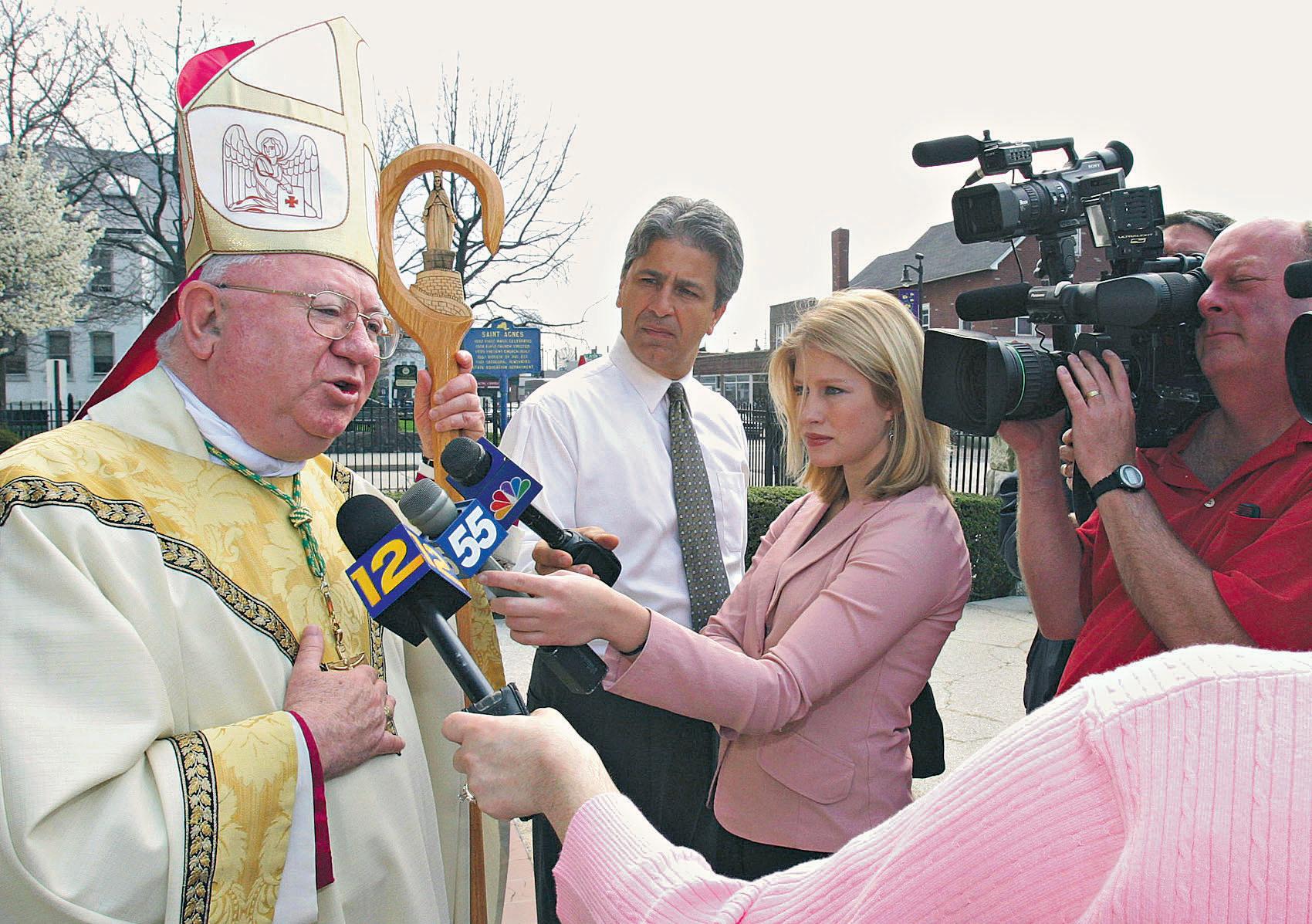
Continued from Vista 1 bureaucracy, nothing remains hidden for very long. For example, since the second Vatican Council (1962-65), a body called the Synod of Bishops has met 20 times in Rome, bringing together some 250 bishops from around the world to advise the Pope. They deliberate for three weeks, and at the end they adopt a set of propositions. The bishops are sworn to absolute secrecy about the content of the propositions and, every time, without fail, an Italian news agency called Adista publishes the propositions within a matter of days.
How? They do what reporters do - they gather news from their sources, without getting an engraved invitation from officialdom to do so. Indeed, many bishops at the Synods are actually eager to hand out the texts of their supposedly secret speeches, wanting to see their golden words in print. The problem with the Vatican is not that it is secretive, but that it is unique, and it takes time to become familiar with the system and its personnel.
Once that’s accomplished, however, there’s very little an enterprising reporter can’t ferret out.
Why is the secrecy myth a problem?
● It leads to a tolerance of speculation, and this means that a lot of frankly ridiculous reporting ends up in print or on the air. Then, everyone else has to respond, and time and energy gets tied down in doing nonstories. (A good recent example was the theme about an “aging, out of touch” Pope John Paul II manipulated by his aides that cropped up repeatedly in reporting on the sex abuse scandals).
● It creates an impression that there is no hard information about the Vatican; hence one guess is as good as another about what’s hap-
pening. This confusion obscures the distinction between correspondents who make it up as they go along and those who carefully cultivate sources and handle information responsibly. The result is that some people regard covering the Vatican as a half-step up from a gossip column.
Hence, an appeal to editors: Declare a moratorium on the “ultra-secretive Vatican” rap. You’ll be doing the journalistic enterprise a favour.
There are several other difficulties facing a Vatican correspondent (what the Italians call a Vaticanista), created by the unique nature of the assignment.
Time: To cover the Vatican well, one must master at least three foreign languages: Italian, because it is the working language of the papal bureaucracy; the language of the Catholic Church, because without a knowledge of Church history, scripture, theology, liturgy and canon law, a Vatican reporter will be lost; and the language of the Roman Curia, the Pope’s civil service, which has its own history, culture and argot.
It’s a beat where personal contacts outside official channels make an enormous difference and that takes time to cultivate. It requires taking Vatican officials to lunch and dinner, attending the sometimes tedious symposiums and book presentations and embassy parties, where contacts are made and impressions formed, and reading theological journals and news services in several languages where intelligence on the Vatican is found. A reporter needs the phone numbers and email addresses of theologians and Church historians and diplomats, with the understanding that these people are disposed to be helpful. With English-language journal-
ists, coverage of the Vatican thus amounts to a mismatch: Most reporters are constrained to do less than full-time work on a beat that demands more than full-time competence. News organisations need to free up the time and resources to do the job right.
Cultural Gaps: While Italian is the default working language of the Roman Curia, people who deal with the Vatican use any of six European tongues: Italian, French, German, Spanish, Portuguese and English. “Vatican documents” are prepared in any or all of these languages (English is not always among them).
Moreover, the reporting, theological discussion, and correspondence important to understanding the Vatican goes on in all six of these languages and many more. This places a premium on linguistic competence, leaving many AngloSaxon journalists disadvantaged.
The result is that American and English reporters covering the Vatican tend to depend on Englishspeaking officials, thereby limiting their range of sources.
Language is the doorway to culture, and reporters covering the Vatican face the challenge of crossing the gaps that divide Anglo-Saxon readers from other cultures. For example, southern Mediterraneans have a very different attitude towards law than Anglo-Saxons. Mediterraneans see law as an expression of an ideal, understanding that most people in most circumstances will fall short; Anglo-Saxons regard law as the rule to be obeyed. Hence, when the Vatican inveighs against birth control, Anglo-Saxons are scandalised because many Catholics simply disregard the rules; in Rome, the attitude is, “What else is new?”
There are also Latin Americans, Asians and Africans in the Vatican,
John Allen is perhaps the most respected journalist writing on the Vatican. Here he looks at several problems that are especially pronounced in English language journalism regarding the Vatican: the myth of secrecy, a lack of understanding, and an unwillingness by media organisations to commit the necessary resources to do the job well.
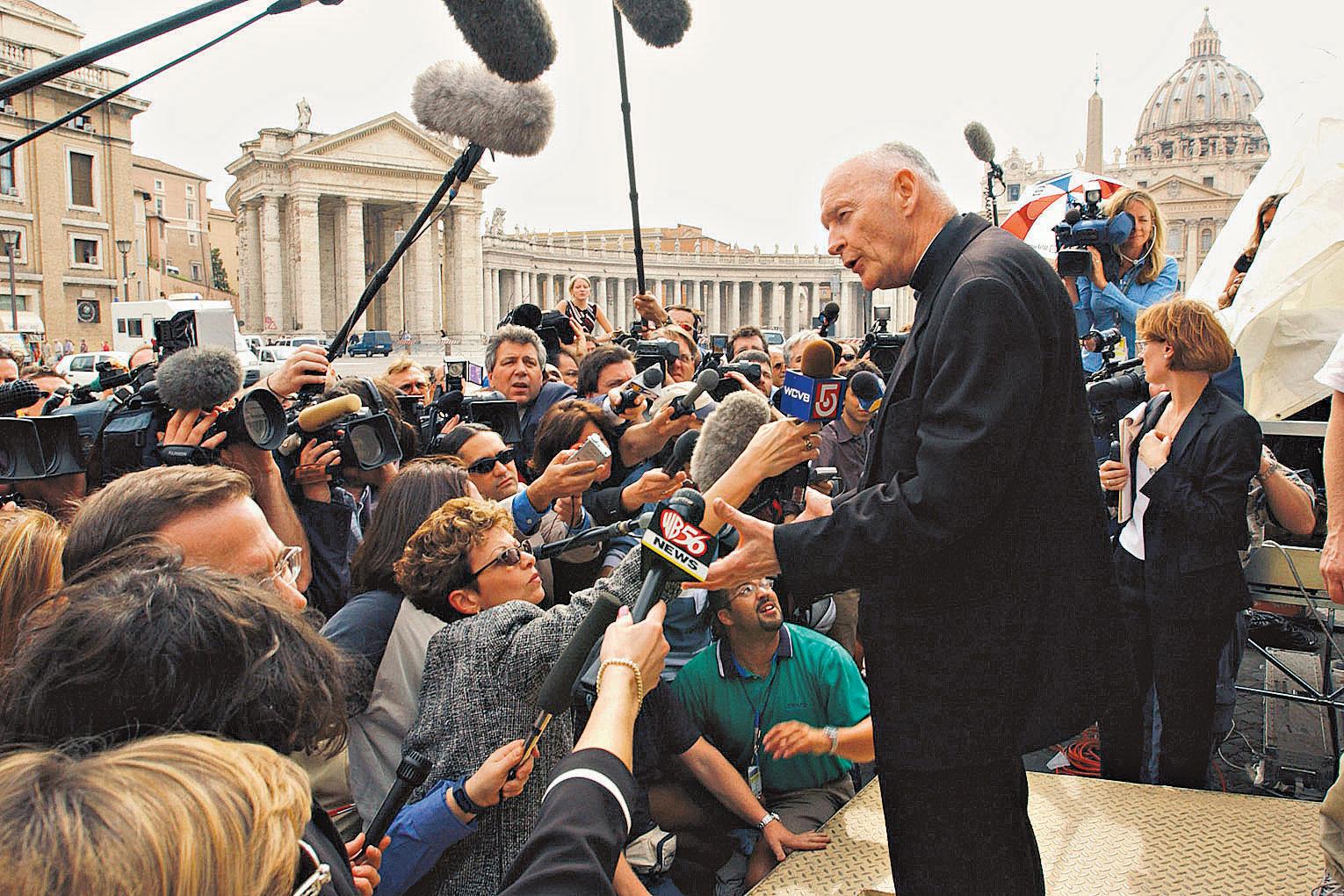
as well as northern Europeans and North Americans. In order to cover the beat, one has to know something about the cultural background, both social and ecclesiastical, of all these regions, be able to apply them to specific debates in the Church, and then explain the impact of those differences to readers. This amounts to an exercise in cultural anthropology that doesn’t come easy.
This cultural gap became clear
in coverage of the sex abuse scandals. For example, Vatican officials repeatedly expressed caution about policies obliging bishops to report accusations of sexual abuse against priests to the police. Americans, by and large, saw this as a coverup. For churchmen (such as Pope John Paul II himself) from cultures in which the police and criminal justice system have frequently been tools of oppression, however, there was a very different outlook. Good
reporting means providing the cultural context necessary to help the readers understand.
Lack of Spin: As much as journalists complain about spin doctors, the truth is that when a major story is breaking, it can be helpful if an institution puts public relations people in the field. At the very least they can provide basic information and, in the rush to file stories or assemble TV packages, the institution’s view gets into the mix.
For whatever reasons, the Vatican doesn’t spin its own story very well. When the American cardinals were in Rome in April 2002 for a special summit with the Pope on the sex abuse crisis, an army of American reporters occupied the square outside the Vatican press office. They were desperately hoping for any scrap of information or comment. While the American bishops did a creditable job of making themselves available, little was
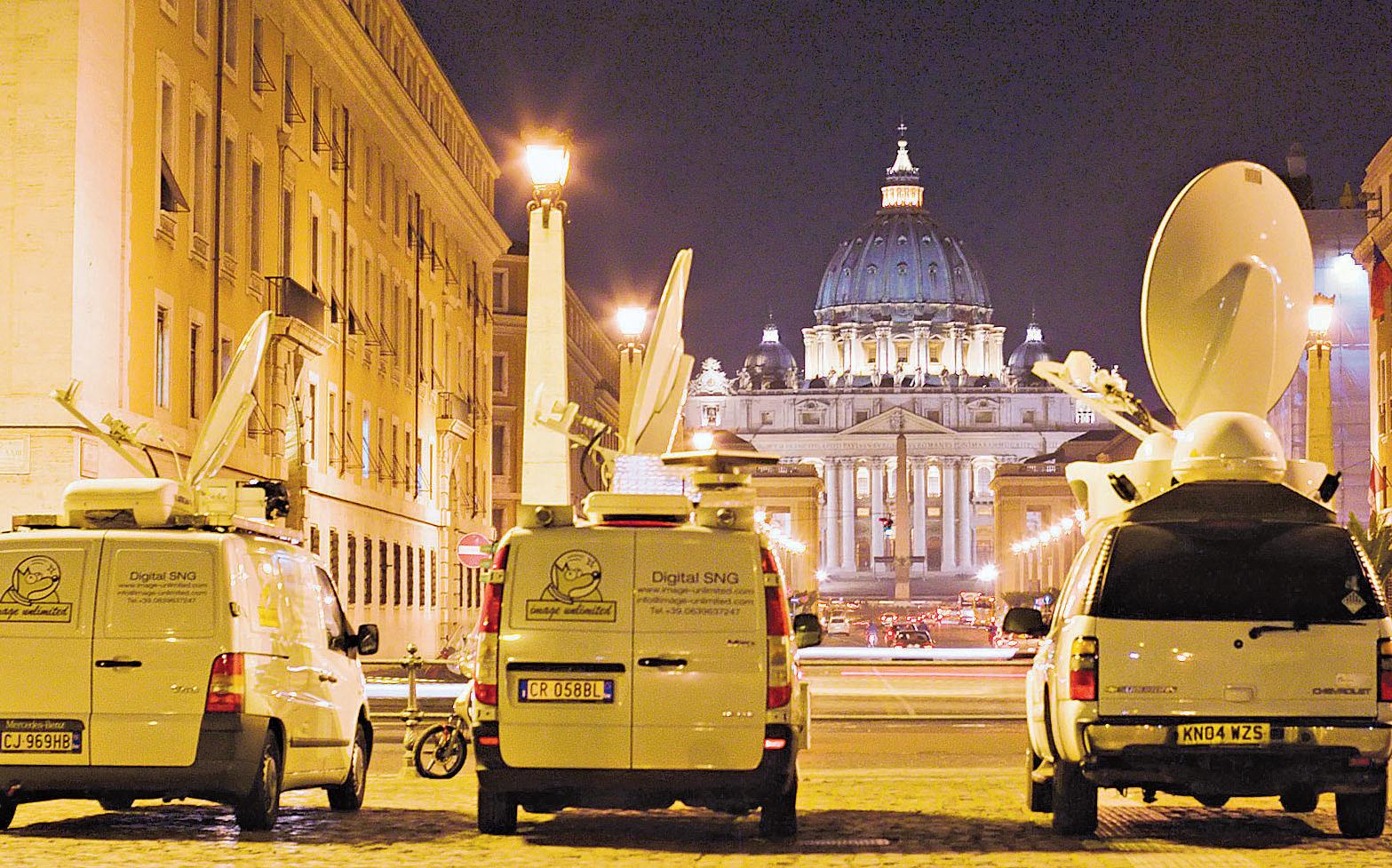
forthcoming from the Vatican, to the point that many reporters were still desperate to find someone who could tell Rome’s side of the story. This absence of spin can be seen as either a symptom of an unaccountable institution that disdains the press or a charming lack of concern for public relations. Either way, it creates a real headache for journalists. The Vatican press office closes most days at 3.00 pm; if news breaks later in the afternoon, reporters are basically on their own. There is also no such thing as a daily briefing, and top Vatican officials almost never give news conferences. When they want to communicate with the world, they typically grant an interview to one Italian news outlet, counting on the rest of the press corps to pick it up.
Sourcing: The Vatican employee handbook specifies that only the officials at the highest levels in a given office are allowed to speak with the press. Technically, this would mean only three people in each of the nine congregations and 11 councils, a grand total of 60 people, can deal with reporters. In fact, Vatican reporters talk all the time to the desk officers who actually do the work. This rule means, however, that most Vatican sources can never be quoted by name.
Even for those officials who can theoretically speak to the press, many prefer to do so only on background. For one thing, in Vatican culture the emphasis on someone’s “competence” is very strong, so that if it’s a particular official’s job to speak on an issue, colleagues are reluctant to be seen as invading his area of responsibility. For another, Vatican officials often see the press do a lazy job of reporting, so they are understandably wary about attaching their name to information that might be misused.
The result is that Vatican correspondents are frequently constrained to write stories on the basis of unnamed sources. Good reporters find this a frustrating, dangerous practice, and do everything they can to get voices on the record. The problem, of course, is the potential for abuse. Who are these unnamed sources? How does the reader know they’re real or how seriously to take their information? In the end, only the journalist’s reputation offers a reliable guide.
To cover the Vatican well, one must master at least three foreign languages
Lack of Editorial Critique: If a White House reporter filed a story claiming that George W. Bush was about to resign, it wouldn’t make it very far up the copyediting chain before somebody raised questions.
Most editors know enough about the White House to realise how improbable such an event is and have their own sources from whom they could get an independent read of what’s going on. That kind of familiarity with the Vatican doesn’t exist inside most English-language newsrooms.
Copyeditors and assignment desks didn’t have much sense of who John Paul II was, how the Vatican works, or the internal politics of the Catholic Church. The result: Stories that would never make it past the editorial filters on other beats can sail through when it comes to the Vatican. Correspondents thus have to find other sources of feedback and critique for their coverage of the Vatican and, like any selfimposed discipline, there’s always the tendency to get lazy.
Lack of Editorial Commitment: It’s a well-documented reality
that editors and reporters in the American media tend to be less religious than the general population, at least as measured by participation in institutional Churches. Many editors regard religion as a less serious beat than politics and finance. The Vatican seems a bit like Buckingham Palace: good theatre, but the real news is at 10 Downing Street.
The wake-up call in the sex scandals of 2002 for the American press was that the Vatican is an enormously consequential player in the lives of 65 million American Catholics. News organisations scrambled to get people into Rome to do stories on how the Vatican makes decisions, how it views the American situation, who is actually in charge, and which policies are likely to be pursued.
That interest, however, was episodic and diminished quickly. There is little sustained commitment in many news organisations to getting the Vatican right. Even when reporters do produce serious, well-sourced, groundbreaking stories, they sometimes find little editorial interest in their own newsrooms. Aside from occasional bursts of frenzy related to coverage of the death of the Pope, there’s been little new investment of resources to bring a more attentive, deliberate focus to the beat.
Until this neglect changes, the English-speaking world will get the uneven Vatican coverage it deserves. We can’t blame that on Vatican secrecy.
John L. Allen, Jr. is the Vatican correspondent of the National Catholic Reporter, an independent American newsweekly, and a Vatican analyst for CNN and National Public Radio. He is the author of several books, including a recent biography of the-then Cardinal Joseph Ratzinger.
This article first appeared in America magazine, before the death of Pope John Paul II.
Page 2 June 16 2005, The Record June 16 2005, The Record Page 3 Vista Vista
Vatican officials need to be more available - including having a full time press office - while media organisations need to improve their understanding of the Church, writes Allen. Photo:CNS
Often, it’s only the controversy that interests the media - then they’re gone. Photo:CNS
Brilliant technology also needs context
Photo:CNS
Like so much else, justice begins at home
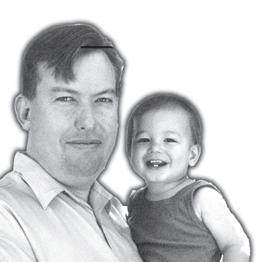
 ■ With Derek Boylen
■ With Derek Boylen
Isaiah, our one and half year old, has five favourite words “ta,” “bye bye,” “Mama,” “Dada” and “MINE!!!” When he sees Mum or Dad coming to confiscate something he heads off at a hundred
the family is the future book review
miles an hour shouting “MINE” at the top of his voice. When his big brother Elijah decides to take something off him he comes to us pointing and calling “MINE!”
Our little Isaiah is developing a sense of justice. Or should I say injustice. From an early age the family is the first place that we come to develop our understanding of the meaning of justice and mercy. Christ’s ministry on earth was particularly concerned with justice and mercy. He proclaims that he has come to give liberty to captives, sight to the blind and freedom to the oppressed.
While getting caught up in daily life we can sometimes lose sight of the important role that family plays in helping the world to become a better place.
As parents we need to be careful to ensure that the justice we measure out really is fair and does not place too much burden on the oldest all the time. We need to be careful that our justice is not designed simply to meet our own needs for a bit of peace and quiet rather than the needs of our children.
The family has an immense power when it comes to bringing about justice - or injustice
I was walking past the Fremantle courts some time back and happened to be passing a mother and child sitting on the steps. I overheard her telling her son that this
was where the criminals get sent to jail because they are “the lowest scum of the earth.” Hearing this, my heart sank. The family has immense power when it comes to bringing about justice and injustice because the family is one of the safest places to discuss it.
As Catholic families it is vitally important that we discuss, around the kitchen table, issues such as the war in Iraq, the way that refugees are treated, the abortion rate within our culture and other such contemporary issues. This is the way that we help our children to start thinking about these issues as responsible adults and to assist the formation of their conscience.
We can’t just leave this formation to the school system or the media. The family has a unique role to
play. The family is one of those rare places in society were we can often, openly speak our mind on these subjects without fear of sacrificing the relationships we care about. Because of this it is one of the few places where such controversial issues can be discussed openly and frankly without fear of persecution. In doing so we help our children to develop the skills and knowledge to raise these issues in society and the world.
It is vitally important for the development of our children too. The early childhood years all the way through to young adulthood are the most critical period for the development of social justice and morality. If we want our children to grow into just, moral members of society then it all begins at home.
50 years too late, editors miss the truth
The Great Labor Schism
A Retrospective, edited by
Brian Costar, Peter Love and Paul Strangio. Scibe Publications.
■ Reviewed by Brian Peachey
This book is biased. Many of its contributors have promoted the myth that the Split in the Australian Labor Party was caused by Catholics and the ALP Industrial Groups. They also have set out to tarnish the reputation of a great Australian, the late BA Santamaria.
It is a compilation of some of the papers and opinions presented at a conference organised by academics from Monash University in the Victorian Parliament on April 15 and 16.
The Split was the most important, dramatic and far-reaching incident in Australian political history in the twentieth century. It damaged the ALP and resulted in the formation of the Democratic Labor Party.
This destructive event had a profound impact on the governing of Australia for two decades. It detrimentally changed the once-honourable Australian Labor Party, which had admirable concerns for national development, the welfare of working class families and the underprivileged. After the split the ALP became a party, firstly dominated by the extreme pro-communist Labor left and then by a net-work of a new class of trendy lobby groups, espousing policies, that damaged families and undermined many of the moral values and standards of behaviour that were once generally accepted by the majority of Australians.
The three editors Costar, Love and Strangio heightened my concerns of bias in the preface. While referring to what is the most balanced work on the Split by Robert Murray, The Split: Labor in the Fifties they then go on to say that “Bruce Duncan’s 2001 magnum opus, Crusade or Conspiracy?Catholics and the Anti-Communist Struggle
is unsurpassed for the breadth of its research and the light it shines on the internal dynamics of the anti-communist Catholic Social Studies Movement and the dispute within the Australian Catholic community.” There is no mention of Santamaria’s classical work, Against the Tide or his biography of Melbourne Archbishop Daniel Mannix, Duncan’s book is biased and seriously flawed. When it was published I reviewed it and wrote to him.
Like other liberal Catholics he was philosophically anti anti-communist. He ignored a great amount of valuable published material. In dealing with the threat of Communism to Australia he never referred (even in the lengthy bibliography) to the published books of Lance Sharkey, the Communist Tribune or the Communist Review.
Although Frank McManus was involved with the Victorian Labor Party since 1940 and was a full-time employee and a delegate to the Hobart Conference and a DLP Senator from 1956 to 1973 Duncan makes no mention of the McManus book, The Tumult and the Shouting. McManus’ testimony was of great value to any genuine historian writing on the issue.
He ignored the dominant role played by the pathologically bitter anti-catholic F E (Joe) Chamberlain before, during and after the Hobart Conference. Without his leadership the left would not have won and there may not have been a split following the Hobart Conference.
Nevertheless Chamberlain was determined to rid the party of Catholics and anti-Communists and the split may have come at a later date.
An indication of the motives of the editors, in the 21 chapters of this review book the authors mention Chamberlain only briefly and do not deal with his dominant role.
In his chapter, The Puzzle of Santamaria’s Politicisation of Catholic Movements, Bruce Duncan sneeringly says, “The Vatican intervention against the Movement in 1957 confirmed that Santamaria was not authorised to act as the political arm of the Church.”
In my criticism of his book, Crusade or Conspiracy? I said “You could have been more generous if you had published the whole of the Carboni statement of April 12 1959.”
His Excellency Most Reverend Romolo Carboni, S.T.D., J.C.D. was the Apostolic Delegate to Australia, New Zealand and Oceania between 1953 and 1959. He was sent to Australia representing Pope Pius
XII at a time when the struggle against communism was reaching a peak and tensions were developing within the Labor movement and the Church. Two years after the Vatican intervention at the 19th Convention of the National Catholic Rural Movement in Albury NSW this scholarly diplomat and representative of the Pope in Australia made the most remarkable eulogy ever made of an Australian layman.
Because it is so pertinent to this review it should be published in full. He said:
“In your Secretary, Mr Santamaria, you have been blessed with a genuine Christian man of unbelievable apostolic exuberance and outstanding intellectual brilliance, a genius for organisation and a leader able to elicit the fullness of dedication and loyalty from his followers, even though he has been unable to promise that they would receive any other repayment than that which the men of the first century repaid the Divine Master and his apostles: misunderstanding, opposition, contempt, even death.
“Looking at things the way the world does, one might have prophesied for Mr Santamaria in his student days a most resplendent future. His University record could have ensured for him a monetary remuneration and mundane success far beyond the hopes of his fellows. It could have offered him acclaim, possessions, temporal prestige. Yet when an invitation of his Archbishop to dedicate himself and his remarkable talents totally to the lay apostolate, to the dynamising of the Catholic laity was received, this truly great Christian man responded immediately. He knew that his choice would mean foregoing of legitimate riches, of worldly praise, even of understanding and friendship from many of his fellow Catholics, yet he unhesitatingly accepted.
“You know his achievements: a united Christian family of eight magnificent children, joyfully imbued with spirit of Christ; an unsurpassed record of loyalty to his Archbishop who, expectedly, in his turn, nominated Mr Santamaria as his own special representative to the second World Congress of the Lay Apostolate; a long list of published writings, reaching from the magazine article to the full length book, each manifesting an almost unique grasp of the import and moment of contemporary issues.
“He has impressed me as a genuinely Christian and apostolic man. I am sure that even those, who at times disagree with his views could not doubt his competence and sincerity, his readiness to discuss his own
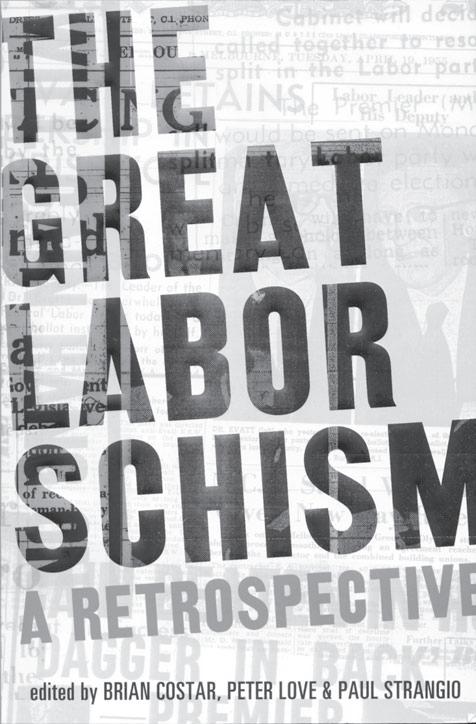
attitudes with others in complete understanding and charity.
“In his Christian dedication and generosity, I would propose him as a model to every Christian man, woman, boy and girl.”
When Ross Fitzgerald published The Pope’s Battalions - Santamaria, Catholicism and the Labor Split in 2003 I wrote a very long criticism of the work and said: “It is a biased or incompetent assessment of Santamaria and of the period; there are many glaring omissions; many suppositions and it is riddled with errors. It denigrates the memory of a truly great Australian, which was Fitzgerald’s intent.”
Despite its poor quality and like Bruce Duncan’s book many of the authors in this book use it as a reference. Crusade or Conspiracy? appears in endnotes 34 times and The Pope’s Battalions 25 times.
A further assessment of where the editors of the book stand is the invitation to Jenny Hocking to give a glowing commentary on Frank Hardy’s novel, Power without Glory. Frank Hardy was an active member of the Communist Party. When Hardy wrote the novel in the latter part of the 1940s Australia faced a serious threat from international Communism and powerful and strategically important industrial unions were under Communist control, causing havoc to the Australian economy. Like Lance Sharkey and others, Hardy’s loyalties were with the Soviet Union.
Page 4 l June 16 2005, The Record Vista
Reviews
3D movie provides positive imagery movie
The Adventures of Shark Boy and Lava Girl
■ By David DiCerto
Here’s a novel approach to making a movie that children will enjoy: Have a kid come up with the idea. “The Adventures of Shark Boy and Lava Girl in 3-D” (Dimension) is an enjoyable family fantasy that is truly a “family” effort. The movie was directed by Robert Rodriguez based on characters created by his 10-year-old son, Racer Max.
It tells the story of a timid 10year-old with a fertile imagination, coincidentally named Max (Cayden Boyd), who spends much of his waking life lost in daydreams, as an escape from mundane daily anxieties. He is constantly picked on at school by the class bully (Jacob Davich) and, while they shower him with love, his parents (Kristin Davis and David Arquette) are always fighting with each other.
Unlike Walter Mitty, Max is not the star of his flights of fancy, merely their chronicler, living vicariously through two invented superheroes:
Shark Boy (Taylor Lautner), a gilled lad raised by sharks with the jaws to prove it; and the flaming Lava Girl (Taylor Dooley) who, as her name implies, can turn into molten lava.
But Max spends so much time in his own head that he has trou-

ble distinguishing between what’s real and what’s imagined. So he’s only somewhat surprised when the aquatic wonder and the volcanic vixen actually appear - interrupting his math class - and enlist his help.
They blast off on a mission to save a distant world - the planet Drool - from the sinister machinations of Mr Electric (George Lopez, also Max’s teacher), who wants to rid Drool of its dream power. With its bubblegum-coloured sky and computer-generated Candy-
Land terrain, Drool is about as far removed as possible from the gritty monochrome back alleys of “Sin City” (Rodriguez’s most recent attempt at virtual world creation).
Instead of hulking hit men, Drool is inhabited by roly-poly giants who lumber through valleys of milk and cookies.
Jungian psychologists would have a field day deconstructing the surreal Daliesque dreamscape, but kids will be delighted by the whimsical visuals and wild gadgets,
including Shark Boy’s shark-shaped rocket ship.
There are even enough clever sight-gags to keep adults amused: “brainstorms” that literally rain spongy brains, a trip down the “Stream of Consciousness,” and a ride aboard a “train of thought.”
The 3-D effects are an improvement over Rodriguez’s last foray into funhouse filmmaking (“Spy Kids 3-D”), but he still hasn’t figured out how to incorporate them into the narrative without a feeling
of gimmickry. The 3-D detoursthough visually entertaining - grow tedious and distract from the genial tale.
With its “don’t smash people’s dreams” theme, “Shark Boy and Lava Girl” imparts a positive message about the importance of fostering creativity, echoing Einstein’s adage that “imagination is more important than knowledge.”
The film contains some light comic book violence and mildly rude humor.
Kids flick sends positive message about friendship movie
Madagascar
■ By David DiCerto
Aquartet of pampered zoo animals take a walk on the wild side in the entertaining animated comedy “Madagascar” (DreamWorks).
Directed by Eric Darnell and Tom McGrath, the tale opens in New York City’s Central Park Zoo, where we meet discontented zebra Marty (voiced by Chris Rock), who, on his 10th birthday - middle age for a zebra - heeds the nagging call of the wild and makes a break to explore the untamed outback of Connecticut.
Though quite happy in their comfy captivity, his zoo mates - lion Alex (voiced by Ben Stiller), the zoo’s star attraction; hypochondriac giraffe Melman (voiced by David Schwimmer); and hippo Gloria (voiced by Jada Pinkett Smith)follow in comical pursuit through
Manhattan’s subway system. In the midst of their adventure, they are caught, crated and shipped back to Africa, because the zookeepers think the mischief was a result of urban stress.
While en route, a group of showstealing penguins hijack the freighter and abruptly change course to Antarctica, causing the shipping crates to topple overboard. (The penguins’ “Great Escape”-style breakout is a hoot.)
The cargo boxes wash up in Madagascar, where the foursome is, er, lionized by the local lemur population, lorded over by King Julien (voiced by Sacha Baron Cohen), who gives new meaning to the word “party animal.” The lemurs live under constant fear of the caninelike foosa, the island’s main predators.
In a reverse “Born Free” twist, the castaways find it difficult adjusting to life in the wild; this is especially true of the mollycoddled Alex, who longs to return to captivity.
Meanwhile, the lemurs try to convince the city slickers to stay by showing them the upside of their exile, in the hopes that their oversized presence (and Alex’s top-
of-the-food-chain credentials) will keep the foosa’s diet lemur-free.
But the whimsical comedy takes an unexpectedly dark turn when Marty and Alex’s friendship is tested. As Marty finds out about his maned mate, you can take the carnivore out of the wild, but you can’t take the wild completely out of the carnivore.
Visually, “Madagascar” is a delight, with vibrantly lush jungle backgrounds and richly detailed cityscapes. But the movie’s early Big Apple sequences promise a better film than actually unfolds. Despite a strong setup, the plot is pretty bare. Once the action switches to the island setting, the film’s sharp wit gives way to a slapstick brand of broad cartoon comedy which, though quite funny at times, is more sight gags than story.
Compared with DreamWorks’ past computer-animated offerings, “Madagascar” doesn’t quite compare to “Shrek,” but ranks heads and fins above “Shark Tale.” As with those two films, “Madagascar” is full of pop-culture references (though to a lesser degree), which may in years to come date the humour somewhat.

The voice talent is good across the board, though no one really stands out (with the possible exception of Rock). Following the current trend of animated features, “Madagascar” has something for everyone. The motley menagerie will have the kiddies - and toy marketing executives - giddy with laughter. Parents, on the other hand, can view the film’s subtext as a Lockean refutation of Rousseau’s nostalgia for nature, or an indictment of modern society’s enthronement of comfort over freedom ... or they could just have a
blast picking out the clever movie references (including “Planet of the Apes,” “American Beauty” and “The Twilight Zone”).
“Madagascar” imparts a positive message about friendship. And apart from a few rude expressions and innocuous off-colour jokes, the film’s wild kingdom wackiness is, like Alex, rather tame.
The film contains mildly crass language and humor, cartoon violence, as well as some thematic elements that may be disturbing to very young children. - CNS
June 16 2005, The Record Page 7
Taylor Dooley, left, and Taylor Lautner star in a scene from the movie “The Adventures of Shark Boy and Lava Girl in 3-D.” Photo: CNS
Alex (lion, voiced by Ben Stiller) tussles with Marty ( zebra, voiced by Chris Rock) in the movie Madagascar.


The World
Vatican welcomes G-8 debt decision
Vatican welcomes decision to write off $40billion debt write off, but calls for increased aid for impoverished nations
■ By John Thavis
VATICAN CITY (CNS) The Vatican hailed an agreement by the world’s richest nations to cancel $40 billion of debt owed by some of the world’s poorest countries, but said the move should be followed by an increase in development aid.
A statement June 14 by the Pontifical Council for Justice and Peace said the debt cancellation should be “the first of many steps” taken to brighten the future of the world’s poor.
On June 11, finance ministers from the Group of Eight industrialized nations the United States, Britain, Japan, Canada, Russia, Germany, Italy and France met in London and agreed on the debt write-off package.
Eighteen poor countries, most of them in Africa, will benefit immediately from the debt cancellation. The plan could eventually be extended to 20 other countries if they submit economic adjustment programs.
The Vatican statement commended the richer countries for “finally” moving to erase some of the debt burden, and recalled that the Catholic Church has been pushing for debt relief for many years.
“The decision to forgive the debts of those countries and move toward furthering the debt forgiveness for others is a clear sign of the solidarity that people of developed nations must have for those living in developing countries,” the statement said.
The Vatican said it was important, however, that the funds freed by debt forgiveness now be used to provide necessary public goods, such as clean water, basic health care and education.
It also chided the developed world for failing to live up to previous pledges on development aid, in particular the commitment by many nations to boost foreign aid budgets to 0.7 percent of their national income.
“The promise was made but only a small fraction of that money has ever been provided.
“This is the sort of program that should go hand in hand with debt relief.
“It is not enough to simply wipe away the debt. An increase in development aid should follow,” the Vatican statement said.
“Developed countries cannot continue making empty promises and agreeing to development programs that will not be carried out,” it said.
All European countries have promised to enact the 0.7 percent pledge by 2015.
The United States and Japan so far have not agreed to set a similar timetable.
The Vatican missionary news
Mock wedding outrage
Gay activists criticised for mock wedding in Paris cathedral
The Archdiocese of Paris has urged better protection of religious freedom after a priest was beaten up while trying to stop a mock gay marriage in Notre Dame Cathedral.
Up to 50 members of a gay rights group, Act-Up Paris, participated in the spoof wedding between two women after Mass on June 5 celebrated by Paris Archbishop Andre Vingt-Trois.
“A church ... absolutely cannot be used in this way. The laws of our republic should uphold the fundamental principle of freedom for religion and its exercise,” the archdiocese said in a statement posted on its Web site.
The cathedral’s rector, Mgr Patrick Jacquin, received first aid from firefighters after being kicked and punched outside the church when he tried to stop the ceremony, which was led by a man dressed as a priest.
Mgr Jacquin told Agence FrancePresse he planned to file a civil complaint against the group for its “barbarous, odious and scandalous acts.”
“This brawny band invaded the cathedral creating obvious trouble (for) public order,” Mgr Jacquin
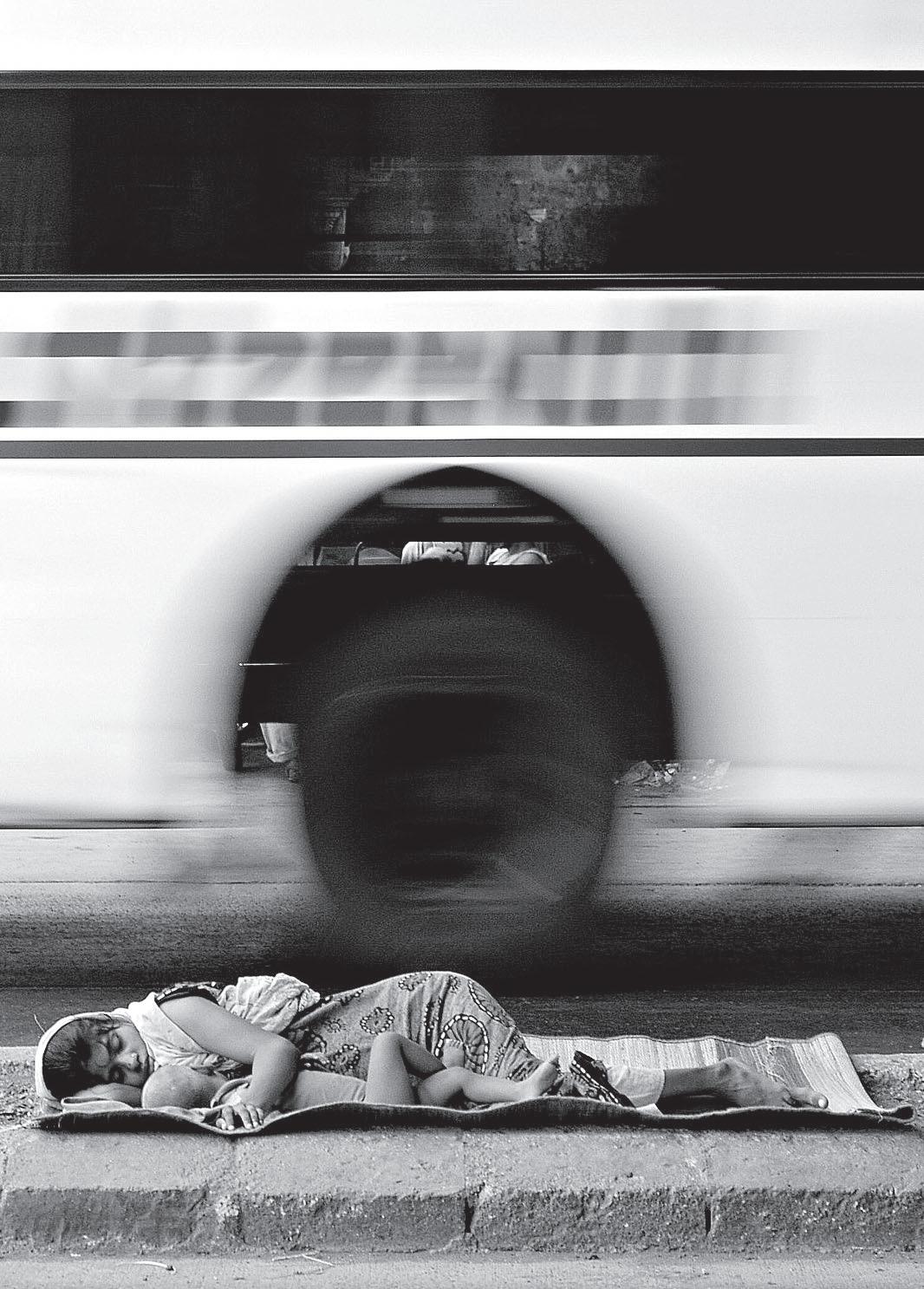
service, Fides, praised the G-8 decision to cancel debt. It expressed the hope that “the resources released
told the French news agency. “They were savages - I was thrown to the ground, stamped on and beaten from behind on the back of my neck until I passed out,” he said.
The head of Act-Up Paris, Jerome Martin, told the news agency that the aim of the “wedding” was to “urge Catholics to reject the Vatican’s retrograde teaching on homosexuality and condoms.”
He said the group had not “wanted to be aggressive toward believers,” but reacted when cathedral guards attempted to remove one of the group’s banners.
Sergio Coronado, spokesman for France’s Green Party, said security guards attempted to prevent tourists from photographing and filming the incident.
The Paris Archdiocese said it was the gay activists who became violent and that it was considering legal action against them.
“They can be assured the Archdiocese of Paris, without descending to media competition, is determined to ensure the faith of Catholics is respected,” the statement said.
“This act is extremely grave since it violates the sacred character of this place in an intolerable manner, ridiculing and deriding the faith of millions of French people. It will be a question now of establishing the facts and denouncing these lying allegations,” the archdiocese said.
build schools and hospitals and
offer the people of these countries opportunities for development.”
African bishops also reacted positively to the news.
“We are obviously pleased with the G-8’s decision,” Archbishop Berhaneyesus Souraphiel of Addis Ababa, Ethiopia, president of the Catholic Bishops’ Conference of Ethiopia and Eritrea, told Fides.
Archbishop Souraphiel was a member of a delegation of cardinals and bishops who toured Europe in May calling for the cancellation of poor countries’ debts. The delegation also included prelates from India, Honduras, Nigeria and Zambia.
“Our request has been granted,” Archbishop Souraphiel said. “Now we insist that rich countries must commit themselves for real development in the poorer areas of the planet assigning 0.7 percent of the gross national product for this purpose.”
Bishop Michel Cartateguy of Niamey, Niger, said church leaders there were “overjoyed with the news” of the debt cancellation. Niger, which is facing a serious food shortage, is one of the countries that will benefit from the agreement.
Bishop Cartateguy noted that Niger’s debt had been canceled once before, in 2000, and the government used the money to build schools and hospitals.
He said that unfortunately Niger lacks the funds to make these structures function, “and so we have schools without teachers and hospitals without doctors or nurses.”
New chairman for US review board
Bishop William S. Skylstad of Spokane, Washington, president of the US Conference of Catholic Bishops, has named a new chairwoman and four new members of the National Review Board that monitors diocesan efforts to protect minors from sexual abuse by Church personnel.
He named Patricia O’Donnell Ewers, a Chicago-based educational consultant and a board member since last October, as chairwoman until her board term ends in October 2007.
Bishop Skylstad said the review board has “played a tremendously important role in helping the Church confront and deal effectively with the crisis of the sexual abuse of minors in the Church.”
“I continue to be amazed and inspired by the work the NRB has done and continues to do,” he said.
The board was established by the “Charter for the Protection of Children and Young People.” The bishops adopted the charter in June 2002 in response to the thengrowing national church crisis spurred by revelations about the extent of sexual abuse of minors by Catholic priests over the past half-century.
The board was formed to oversee annual reports on diocesan compliance with the terms of the charter and to commission and
National
Review
Board gets new chairwoman, members
oversee two major studies, one on the nature and scope of the abuse and another on its context and causes. Ewers succeeds Nicholas P Cafardi, dean of the Duquesne University law school in Pittsburgh. A specialist in civil and Church law, he had been chairman of the board since last October.
From 1990 to 2000, Ewers was president of Pace University; she was the first woman to head the 13,000-student institution with five campuses in New York City and Westchester County. Before that she was an English professor and chief academic officer at DePaul University in Chicago. She has served on numerous boards of corporations, academic associations and nonprofit institutions, including Catholic Charities of the Chicago Archdiocese and the Catholic Theological Union in Chicago. Besides Cafardi and Ray Siegfried, outgoing members of the board are New York attorney Pamela D. Hayes and former University of San Diego president Alice Bourke Hayes. New board member Rhode is a father of seven and has served since 2002 on the diocesan review board of the Diocese of San Angelo, Texas. He is chairman
of the credentials committee of Midland Memorial Hospital and he established the hospital’s ethics committee. McGarry has headed Anna Maria College since 1999. Under his leadership it recently established a centre for the prevention of child sexual abuse and abduction and elderly abuse. A father of two, he has held numerous directorships. Before becoming president of Anna Maria he was vice president of administration and finance at Springfield (Mass) College. He has held similar positions at Albright College in Pennsylvania and Rider University in New Jersey.
DeStefano, who headed Brooklyn Catholic Charities for 20 years, was the first layman in that post. A father of two and grandfather of five, he is on the advisory board of the New York City Department of Social Services and has served on a number of other nonprofit and corporate boards. Milann Siegfried has served on or headed boards of a number of institutions. A mother of six and grandmother of six, she was a member of the Oklahoma State Arts Council and is former president and chairwoman of Gilcrease Museum in Tulsa. CNS
Page 8 June 16 2005, The Record
enrich local governments but
to
will not be used for arms or to
rather
A woman and an infant sleep on the pavement next to a road in Mumbai, India, on May 26.
PHOTO: CNS
The World
Pope’s neighbour attends his home
Although Pope might not return, neighbour cares for home, garden
■ By Tess Crebbin
Although Pope Benedict XVI might never return to the home he built and still owns in Pentling, his next-door neighbour cares for the garden each day.
Housekeeper and neighbour Rupert Hofbauer said his relationship with the Pope goes back to 1969, when then-Father Joseph Ratzinger moved to Pentling after becoming a professor of theology at nearby Regensburg University.
“This house is his own. I was there when he bought the plot, hired an architect and built it,” Hofbauer recalled in late May. “He needed somewhere quiet, but within walking distance of the university because he does not drive.
“He came over, introduced himself and said he was going to build a house,” the neighbour remembered. “It became his permanent home, and he returned as often as he could. He usually celebrated New Year’s together with his brother, Georg, (also a priest) just the two of them. In summer, they would often sit on his balcony, reading, or walk around the garden. Then they would retire indoors and make themselves a simple supper.”
When the Pope’s sister, Maria Ratzinger, was alive, the three siblings often took long walks in the woods, he added.
Hofbauer said his family has ben-
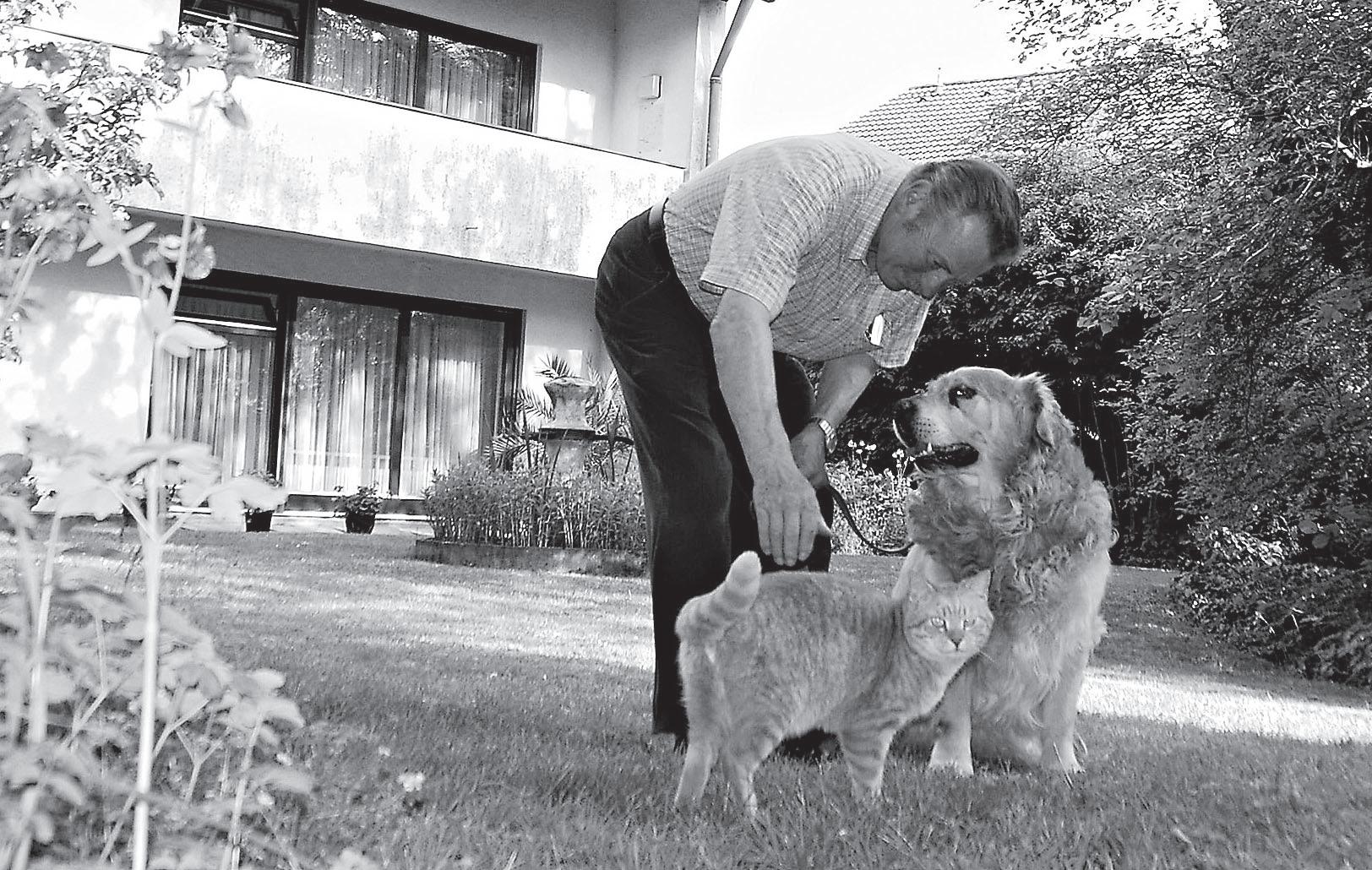
efited from the former cardinal’s influence. “We grew much closer together,” he said. “Whenever we had family problems, I could go and talk to him. He also positively influenced my children, both of whom are successful. He was their role model and took an active interest in their growing up.”
Hofbauer said that once, when his sons were little and playing, they crashed through the garden fence.
The Pope “just smiled and said that fences can be fixed,” Hofbauer recalled. “He always reminded me to be kind to the children, even when they were unruly, saying they
would eventually grow out of it.”
Hofbauer allowed Catholic News Service to look through the windows of the house. The ground floor contains a bathroom and a small bedroom, with a single bed, a desk and glass doors leading into the garden.
The ground floor also has a chapel that has glass doors leading into the garden. The chapel has a wooden floor, a simple cross on the wall, and no chairs or benches.
The Pope “was really a man of God, all along. I know that he prayed in this chapel many times a day,” Hofbauer said. He said the
upstairs has a bedroom, living room, kitchen and another bathroom. The bedroom was used by the Pope’s late sister, Maria. “He kept it just like it was when she died” in 1991, he said.
Beside the bedroom is the living room, where the cardinal would often sit with his brother, reading and writing. The room opens onto a balcony overlooking the garden.
Journalists come here from all over the world and want to get inside the house, but this is a private home and not a museum. I have strict instructions not to let anyone in,” he said. CNS
Priest stabbed
A professor of theology at a Rome university and founder of a Nigerian religious order was attacked and stabbed just outside his residence, a few blocks from St Peter’s Square.
According to Italian news reports, Nigerian Father John Egbulefu, 55, was walking home around 10 pm on June 8 when a motor scooter sped by him and circled back around. The unknown assailant reportedly drove his scooter onto the sidewalk, stopped alongside the priest, then attacked him with a knife, the June 9 reports said.
“He was in very serious condition when they brought him to the hospital last night,” said Consolata Father Giovanni Marconcini, general secretary of Urbanian University, where Father Egbulefu has taught dogmatic theology for nearly 20 years. “He was hit in the colon. He lost lots of blood, but they operated on him last night, and now he is in stable condition,” Father Marconcini said. In the early 1990s Father Egbulefu founded a Nigerian religious order called the Congregation of Christ the Emmanuel. Father Marconcini said the Emmanuelite priest has authored several books and has taught sacraments and liturgy since the late 1980s at Urbanian University, where Catholic missionaries are educated in Rome.
Father Marconcini said that during his hospital visit Father Egbulefu told him he thought the attack “was intentional” and specifically aimed at him.
Fight against AIDS must be lead with fidelity and chastity
Pope says fidelity, chastity are main weapons against AIDS
Following the Church’s teaching of fidelity and chastity “has proven to be the only fail-safe way to prevent the spread of HIV/AIDS,” Pope Benedict XVI told bishops from southern Africa - a region with the world’s highest prevalence of the deadly virus.
“The Catholic Church has always been at the forefront both in pre-
the world in brief
vention and treatment” of HIV and AIDS, he said on June 10 in his address to the bishops from South Africa, Botswana, Swaziland, Namibia, and Lesotho. He urged the bishops to continue their efforts “to fight this virus, which not only kills but seriously threatens the economic and social stability of the continent.”
The Pope’s message came at the end of the bishops weeklong “ad limina” visit, which heads of dioces-
Indian convent attacked
An Indian nun was hospitalised with serious head wounds after robbers attacked a convent in an eastern Indian town. A dozen men broke into the convent of the Sisters of Notre Dame early on June 10 in Raxaul, a town in Bihar state in the Bettiah Diocese, reported UCA News, an Asian church news agency based in Thailand.
Five days earlier, robbers looted a Sisters of Charity of Nazareth convent in Sokho, 170 miles southeast of Raxaul, in the Bhagalpur Diocese.
Both congregations are based in the United States, but all the nuns living in both convents are Indian.
es are required to make every five years. Pope Benedict welcomed the 33 bishops from the five different southern African countries by saying, “how good and pleasant it is when brothers dwell in unity.”
“Even though your region still needs more priests, one cannot help but thank God for the large number of vocations to the priesthood you are currently witnessing in SubSaharan Africa,” he said.
But he encouraged the bishops
According to the nuns in Raxaul, robbers broke open the front door with a boulder and forced their way into a room, attacking 67-year-old Sister Manjula with a thorny tree branch.
Blood donation a plus
Top Vatican officials encouraged blood donation, saying it was a powerful and practical way to carry out Christ’s command to heal the sick.
Pope Benedict XVI, addressing pilgrims from his apartment window on June 12, sent special greetings to blood donors everywhere to mark World Blood Donor Day June 14. He said Christians should find inspiration for blood donation in Christ, who “redeemed us with his blood.” Cardinal Javier Lozano Barragan, head of the Pontifical Council for
“to select conscientiously candidates for the priesthood” and through proper formation help them dedicate their lives “in word and deed” to the Gospel.
“A world filled with temptations needs priests who are totally dedicated to their mission,” the Pope said. “By embracing the gift of celibacy,” priests can fully serve others as Christ did. But bishops must help their prelates see this gift as “lifegiving” through “continued educa-
Health Care Workers, celebrated Mass near the Vatican on June 12 with several hundred blood donation volunteers.
In a sermon, he said many give blood out of a sense of solidarity or compassion for the sick.
But for Christians, donating blood should have another special meaning, he said. “Christ gave to his disciples a specific mandate: ‘Heal the sick,’” he said.
French priest inquiry
Pope Benedict XVI has formed a commission of Church experts to study whether anti-Semitic writings by a French priest should prevent his planned beatification, sources in Rome said.
Father Leon Dehon, founder of the Sacred Heart of Jesus religious order, had been
tion, retreats, and days of recollection.” The Pope urged the bishops not to give up presenting to the faithful, especially young people, “the companionship, joy, happiness and peace which Christian marriage and fidelity provide and the safeguard which chastity gives.”
Sub-Saharan Africa continues to be the region worst hit by HIV/ AIDS, with HIV prevalence rates exceeding 25 percent of the population. CNS
scheduled to be beatified by Pope John Paul II on April 24.
After the Pope died on April 2, the ceremony was expected to be rescheduled for later in the year.
But recent publicity about Father Dehon’s writings on the Jews prompted objections from the French bishops’ conference, the French government and some Jewish groups.
Pope Benedict has temporarily blocked the beatification until the situation can be clarified, Rome sources said on June 13.
According to the French Catholic newspaper La Croix, the problems were caused by seven texts written by Father Dehon, who lived 1843-1925.
The newspaper quoted the priest as writing that the Jews were “thirsty for gold” and “united in their hatred of Christ.”
June 16 2005, The Record Page 9
CNS
CNS
Rupert Hofbauer is seen with his pets, in the yard of Pope Benedict XVI’s property in the village of Pentling. Photo: CNS
Who is this man called Benedict XVI?
A Lutheran minister who converted to Catholicism and became a Catholic priest, Fr Richard John Neuhaus is regarded as being one of the most insightful commentators on the Church today. He has also known Pope Benedict XVI for the last 20 years. Here, the editor-in-chief of First Things shares his views about the new Pope and what could be expected in his pontificate.
Benedict XVI has modest expectations for ecumenism and expects the path to unity to involve an unforeseen initiative of the Holy Spirit, says Father Richard John Neuhaus.
Question: Would you share some of your personal experiences with Cardinal Ratzinger, and what special gifts you think he brings to the papacy?
I have known Cardinal Ratzinger, now Pope Benedict, for more than 20 years, and we have been in conversation about many things.
As everybody knows, he is a master theologian and, I think, might have been recognised as one of the theological giants of the last 100 years if he had not offered the prime of his life to serving John Paul the Great as prefect of the Congregation for the Doctrine of the Faith.
As everybody should know, he is a person of remarkable gentleness and serenity, combined with a keen intellectual curiosity in engaging alternative viewpoints.
As for personal experiences, in 1988 I invited him to deliver our annual Erasmus Lecture here in New York, which was followed by a conference of several days with Catholic, Protestant, and Orthodox theologians.
The public lecture, held in midtown Manhattan, was rudely disrupted by gay activists who waved their pink triangles while screaming pleasantries such as “Sieg Heil!” “Nazi Ratzy!” and “Inquisitor Go Home!” I finally had to call the police to clear the protesters and restore order.
Throughout, the cardinal was the very picture of tranquility. When he got a chance to speak he prefaced his lecture, which was on the subject of biblical interpretation, with a moving reflection on the 1968 student rebellion in Europe that helped him to understand more deeply the indispensability of civility in human relations.
On this and other occasions, it was obvious to me that his tranquility is rooted in a tried and tested faith. The next day the tabloid headlines blazoned, “Gays Protest Vatican Biggy.” He chuckled at his new title of Vatican Biggy.
Question: Benedict XVI has emphasised ecumenism as a priority. Does that surprise you at all?
No, not at all. This has been among his constant concerns and interests, and he has written extensively on the subject of ecumenism. As a German he has had extensive experience with the traditions coming out of the 16th-century divisions, especially Lutheranism and Reformed, or Calvinist,
Christianity.
He has a sympathetic appreciation of what Martin Luther got right, and an incisive but nonpolemical analysis of what he got wrong, and why. As head of CDF, he was responsible for the doctrinal aspects of all the ecumenical dialogues in which the Church is engaged, and will continue to exercise that responsibility.
Although he would of course admit nothing, I see clear evidence of his hand in key passages of the 1995 encyclical on Christian unity, “Ut Unum Sint.” In this pontificate we will, I expect, see a very clear line of authority as the Pope, the chief doctrinal officer of the Church, employs CDF to coordinate other offices dealing with matters of doctrine. CDF was, for instance, intensely involved in the 1999 Lutheran-Catholic declaration on justification.
Question: What does the emphasis on ecumenism say at a time when there are so many concerns about pro-life issues?
There is a strong connection. The Baptist theologian Timothy George speaks about “the ecumenism of the trenches,” referring to the ways in which Catholics and evangelical Protestants in this country have come to know and trust one another in the pro-life cause.
This was also critically important to the continuing project called Evangelicals and Catholics Together, ECT, which Charles Colson and I launched in 1994. I have over the years been in contact with Cardinal Ratzinger on developments in ECT, and he has been entirely supportive.
To be sure, as a European he has had relatively little firsthand experience with American evangelicalism, which is very different from what “evangelical” means in Germany.
But he is very much aware of the explosive growth of evangelical and Pentecostal Christianity in
In Brief
the Southern Hemisphere, and that is undoubtedly comprehended in his ecumenical vision. The Church’s oft-repeated understanding is that the commitment to ecumenism is “irrevocable,” and the goal of ecumenism is the establishment of “full communion.”
On the latter point, Pope Benedict’s expectations are markedly modest. In his writings he has insisted that the only unity we can seek, the only unity pleasing to God, is unity in the fullness of truth. He has said that our 16th-century Catholic and Protestant forebears who were at one another’s throats were, in an important way, closer to one another than is sometimes the case with contemporary theological dialogues because they both understood that what was at stake was the truth that God intends for all his people.
He has also emphasised that the way toward unity is not a matter of our programs and schedules but of faithful waiting upon a new initiative of the Holy Spirit which we can neither control nor anticipate. This does not mean that there is less urgency in his ecumenical devotion than was the case with, to cite the obvious instance, John Paul the Great. The ecumenical commitment is irrevocable and every possible step is to be carefully nurtured, including increased cooperation with other Christians in contending for the culture of life against the culture of death.
Question: Coming from Germany, does he bring a special viewpoint about ecumenism?
While I have already addressed that in part, it is noteworthy that some of the first statements of Pope Benedict have strongly affirmed the quest for reconciliation with Orthodoxy.
For John Paul, being a Pole, the Orthodox reality was more pressingly immediate, but I have
Vatican urges effective laws to protect religion
VATICAN CITY (CNS) - Europe needs effective laws to protect religious groups from being misrepresented or ridiculed in the media, said a Vatican representative at a conference on anti-Semitism and other forms of intolerance. “Intolerance and discrimination against Christians and members of other religions are worrying phenomena which must be faced with the same determination with which antiSemitism and discrimination against Muslims are being fought,” said Archbishop Antonio Canizares Llovera of Toledo, Spain. The archbishop led the Vatican delegation to the June 8-9 conference in Cordoba, Spain, sponsored by the Organisation for Security and Cooperation in Europe. The conference focused on efforts by the 55 participating governments, including the Vatican, to fight discrimination and intolerance of Jews, Christians, Muslims and members of other religions. The Vatican released the text of Archbishop Canizares’ remarks on June 14.
Man running across US aims to inspire
GALLUP, New Mexico (CNS) - When Jonathan Williams arrived in Gallup on June 7, he was one day short of being one month into a run across America that he has undertaken to inspire people to do something positive with themselves and for society. “I’m doing this to promote positive attitudes and goals,” said the 26-year-old. “I want people to think outside of the box.” Williams began his cross-country journey on Mother’s Day, May 8, from California. He will end his run on the other side of the country in Rhode Island. He said he did not realise the significance of his departure date until he started running. “My mother died of breast cancer seven years ago, and I think of her every day but didn’t realise the significance of starting the run on Mother’s Day until later,” Williams said in an interview with The Voice of the Southwest, newspaper of the Gallup Diocese.
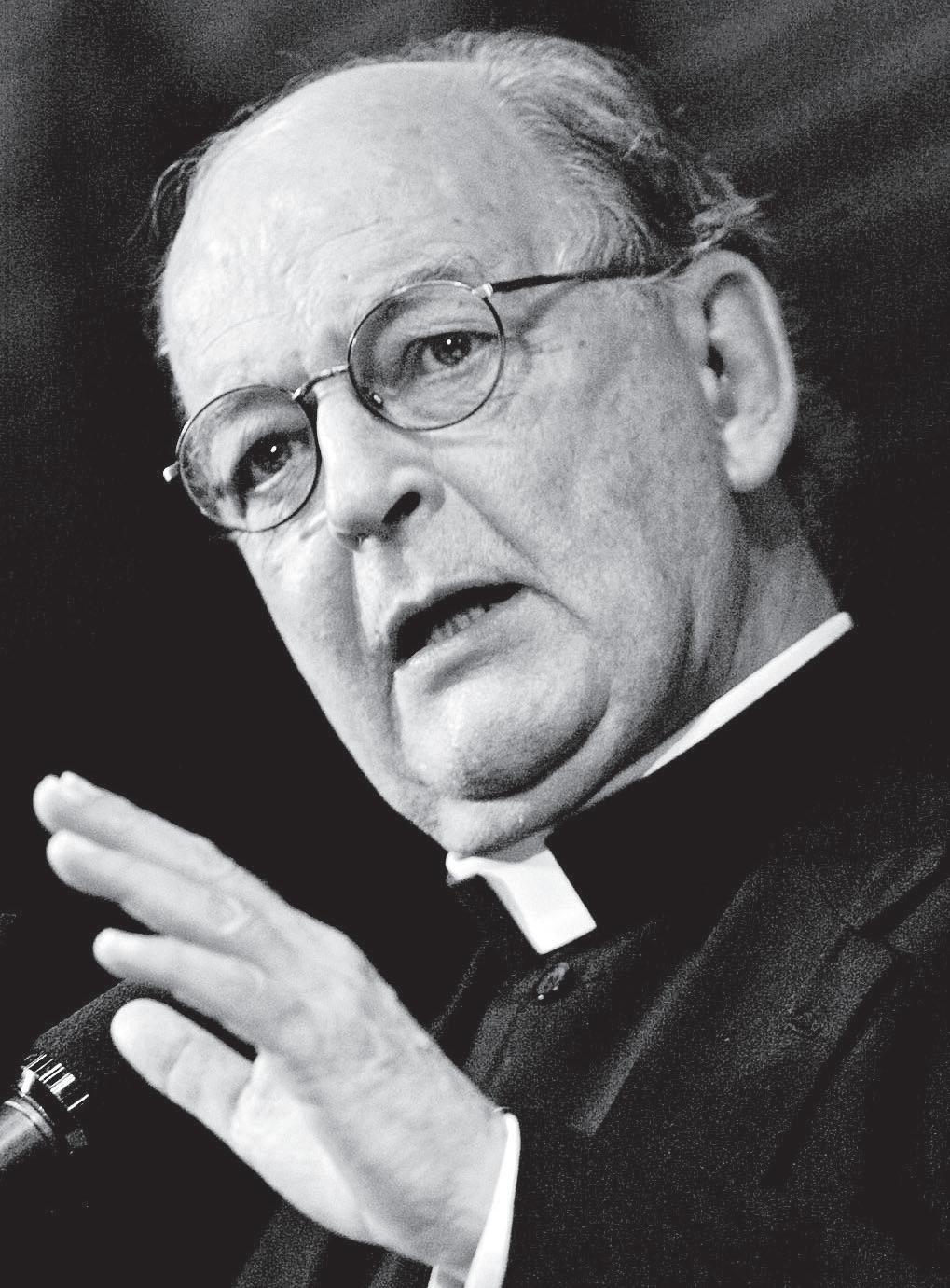
no doubt that Benedict shares his yearning for the time when the Church will once again “breathe with both lungs, East and West.”
I have said that what we share with the Orthodox is such that the only thing lacking for full communion is full communion, and I do not think Pope Benedict would disagree with that. Sometimes being close neighbours makes things more difficult. In that sense, it is possible that the Orthodox will be less uneasy in dealing with a German rather than with a Pole. Admittedly, that is a “non-theological factor,” but God also uses non-theological factors in achieving his purposes.
Question: What has struck you the most about the new Holy Father so far?
There are several things, but perhaps I should mention first his modesty. He has said in several different ways that he does not want to impose his person or his personal views, but to be a faithful servant of the received tradition.
We now have another Pope who is a high-powered intellectual. Under John Paul some worried that his distinctive theological-philosophical perspective was making too strong an imprint on magisterial teaching.
Benedict seems to be anticipating the same concern in his case. After all, he has a “paper trail” a mile wide and miles long, having registered his views on so many questions. He seems to be saying that he is well aware that the responsibilities of Joseph Ratzinger the theologian and Joseph Ratzinger the prefect of CDF are significantly different from his responsibilities as Pope Benedict, and that is surely right.
Another subtle signal since his election, which I expect will become more explicit, is that he wants it understood that the Pope is “the servant of the servants of God,” and especially of his fellow bishops. His earlier strictures regarding national conferences of bishops have, I believe, been seriously misunderstood. He is, in fact, a great
champion of episcopal collegiality and doesn’t want national conferences or other institutions getting in the way of bishops being bishops, which means, above all, being authentic teachers of the faith in their local churches.
Question: How did nonCatholic Christians generally view Cardinal Ratzinger?
The indications are that he is being very well received by Catholics and non-Catholics alike. He does not have, and I expect is not likely to develop, what is called the “star quality” surrounding John Paul. That has a lot to do with different personalities. And it has to do with very different life stories.
John Paul’s biography could hardly have been more dramatic: life under Nazism and Communism, the early loss of his mother and brother, the successful challenging of the Soviets’ “evil empire,” and on and on. His life made great material for producers of admiring comic books.
I suppose there will be comic books about Benedict, but they will be less exciting. Compared with John Paul, his has been a life of remarkable step-by-step continuity.
Despite the Hitler years, his was a happy Bavarian childhood, an early discernment and fulfilment of a priestly vocation, a very successful career as theologian, followed by elevation to cardinal archbishop and then on to Rome. And now he is Pope. It is a life within the Church for the Church.
In the quiet warmth of his personality, the excitement is in the vibrancy of his faith and the profundity of his thought. I mentioned at the outset his gentleness of manner and serenity of soul. Those are not bad qualities to have at the centre in a time when gentleness and serenity are in short supply.
I need only add that it would be a serious mistake to think gentleness and serenity mean weakness or lack of firm resolve.
- Zenit
Page 10 June 16 2005, The Record
Fr John Richard Neuhaus, editor-in-chief of First Things
BUILDING TRADES
■ BRICK REPOINTING
Phone Nigel 9242 2952
■ GUTTERS/DOWNPIPES
Need renewing, best work and cheapest prices. Free quote. Ph: Ad 9447 7475 or 0408 955 991 5008.
■ PERROTT PAINTING PTY LTD
For all your residential, commercial painting requirements. Phone Tom Perrott 9444 1200.
■ PICASSO PAINTING
Top service. Phone 9345 0557, fax 9345 0505.
CATHOLICS CORNER
■ RETAILER OF CATHOLIC PRODUCTS
Specialising in gifts, cards and apparel for baptism, communion and confirmation. Ph: 9456 1777. Shop 12, 64-66 Bannister Road, Canning Vale. Open Mon-Sat.
CHANGE YOUR LIFE FOREVER
■ WORK FROM HOME
Around your children & family commitments. My business is expanding and I need people to open new areas all over Australia. Training given. Highly lucrative. www.cyber-success-4u.org
FOR SALE
■ LUMEN CHRISTI HOMES, AUGUSTA
Lifetime lease (Unit 6). Enquiries: Phone Catholic Diocese of Bunbury 9721 0500
FURNITURE REMOVAL
■ ALL AREAS Mike Murphy 0416 226 434.
JUNE 16 & 17 Confirmation, Greenwood - Fr Greg Carroll
17 “Towards Healing” Seminar - Bishop Sproxton
17 & 19 Confirmation, Riverton - Mgr Michael Keating
18 Confirmation, Thornlie - Fr Brian O’Loughlin VG
18-23 Meeting of National Commission for Clergy Life and Ministry - Bishop Sproxton
19 Mass and Procession for Feast of St Anthony, Wanneroo - Archbishop Hickey Confirmation, Bedford - Bishop Quinn
Confirmation, Myaree - Mgr Peter McCrann
21 Reflection on the Eucharist, Leederville - Archbishop Hickey
22 Reception for National Day of Republic of Croatia - Fr Brian O’Loughlin VG
Sunday June 19
TAIZE MEDITATIVE PRAYER
HEALTH
■ GLYCONUTRIENTS
Now here is a product that could change your life, a dietary supplement that surpasses all others. Glyconutrients are a technological breakthrough and a new area of science. Learn more about optimal health and Glyconutrients by calling: Mary Anne 9284 1662. Find out Glyconutrients can provide you with a healthy business and a healthier life.
HOLIDAY ACCOMMODATION
■ BUSSELTON
Geog Bay, Park Home sleeps UP TO 6 winter rates apply.
Ph Elizabeth 0408 959 671
■ DENMARK
Holiday House 3bdr x 2bth, sleeps up to 8. BOOK NOW. Ph: Maria 0412 083 377
OFFICIAL DIARY
MUMS ON A MISSION
■ SUCCEED FROM HOME Call Christine on Tel: 9256 2895
RELIGIOUS PRODUCTS
■ RICH HARVEST YOUR CHRISTIAN SHOP
Looking for Bibles, CDs, books, cards, gifts, statues, baptism/communion aparells, religious vestments, etc? Visit us at, 39 Hulme Court (off McCoy St), Myaree, 9329 9889 (after 10.30am, Mon-Sat). We are here to serve.
RE-UPHOLSTERY
■ REUPHOLSTERY
Lounge,kitchen,dining,etc. Wide range of fabrics. Warwick, Can/vale, Willetton and surr areas. Call Lawrie 9456 0757, mob 0409 689 955.
ST JUDE
■ THANKS
Grateful thanks to St Jude for favours recieved.
TO LET
■ ROOM IN MEDITERRANEAN STYLE HOME
Vacant room in modern Mediterranean style home. King sized bed, TV, VCR, walk in robe, modern bathroom, foxtel, internet and pool/spa. Shared cooking and washing negotiable. Public transport every half hour to Midland, Morley and Joondalup. The ideal applicant will be a mature woman 35 years plus, non smoker or drinker and Christian values a must, to share with single mother and young daughter. Call Bernadette on 0402 551 787.
23 Mass and Presentation of Youth Book to Yr 12s at Prendiville College - Archbishop Hickey
24 Awards of Excellence in Catholic Aboriginal Education - Fr Brian O’Loughlin VG
24-26 Parish Visitation and Confirmation, Fremantle - Archbishop Hickey
26 Confirmation, Attadale - Bishop Sproxton Confirmation, Carlisle - Bishop Quinn Confirmation, Gosnells - Fr Brian O’Loughlin VG Confirmation, Kalamunda - Mgr Tim Corcoran Confirmation, Merredin - Fr Greg Carroll
28 Visit Confirmation candidates, Applecross - Bishop Sproxton Consecration of Redemptoris Mater Chapel - Archbishop Hickey, Bishop Sproxton
29 Mass for Permanent Deacons-elect, St Francis Xavier, East Perth - Archbishop Hickey Confirmation, Applecross - Bishop Sproxton
30 Confirmation, Mt Lawley - Mgr Thomas McDonald
PANORAMA a roundup of events in the archdiocese
Each third Sunday of the month from 7pm to 8pm come and join in the prayer in a candlelit chapel singing the chants from Taize and some time for silent prayer at the Sisters of St Joseph’s Chapel, 16 York Street, South Perth. Enq Sr Maree Riddler, 9334 0933/9457 3371.
Saturday June 25
MEDJUGORJE ANNIVERSARY
At St Bernadette’s Church, Jugan St, Glendalough. Proceedings commence at 9am with Rosary Exposition, 9.30am Holy Mass with Rev Fr Timothy Deeter, 10.330am Talk by Rev Fr Timothy Deeter on the Medjugorje update, concluding with coffee and discussion at the L.J Goody Bioethics Centre, 39 Jugan St. Enq 9446 1935
Saturday 2 July
DAY WITH MARY
Our Lady’s Assumption Church, 354 Grand Promenade, Dianella will be hosting a day of prayer and instruction based on the messages of Fatima from 9am to 5pm. Activities include Sacrament of Penance, Holy Mass, Eucharistic Adoration, Sermons on the Eucharist and Our Lady, Rosaries, Procession of the Blessed Sacrament and Stations of the Cross. Please BYO. Enq Franciscan Sisters of the Immaculate 9250 8286.
Tuesday 21 June-1 August
NEW LIFE IN GOD’S SPIRIT SEMINAR
St Lawrence Church in Balcatta invites you to come and experience a renewal of the love, grace and power of the Holy Spirit in your life by participating in a New Life in God’s Spirit Seminar commencing
Tuesday 21 June at 7pm in the Church and continuing for 8 consecutive. Our guest speakers for each session include Fr Bob Carden OFM, Fr Paul Carey SSC, Fr Hugh Thomas CSsR, Fr Michael Brown OFM. Our lay speakers are: Mrs Joy MacMullen, Mrs Jenni Young. Archbishop Hickey will be our closing speaker. This course has an approved Accreditation B certificate for all teachers from the Catholic Education Office. Don’t miss this wonderful opportunity for growth and a deeper direction of God’s presence in your life. Cost: $15 which includes a booklet with daily Scripture reading and lessons. More information please contact Fr Dariusz or Jenni Young on 9344 7066.
Wednesday June 22
MOTHERS PRAYERS MASS
9am, Our Lady of Grace Parish, Kitchener Street, North Beach. For all Mothers and Grandmothers coming together to pray for their children. Fathers, Grandfathers welcome. This is a wonderful and necessary opportunity for God to hear and act upon the hearts and minds of mothers joining together as one here on earth. Enq Veronica Peake 9447 0671.
Sunday July 3
GATE OF HEAVEN
Please join us this Sunday at 7.30pm on 107.0 FM, Radio Fremantle, for more Global Catholic Radio. This week we will feature: (1) The Ten Commandments with Fr Benedict Groeschel “The Sixth Commandment”. (2) Life On The Rock with Fr Francis “Chastity and Homosexuality”. Donations toward the program may be sent to Gate of Heaven, PO Box 845, Claremont, WA 6910.
Saturday July 9
CROSS ROADS COMMUNITY INVITES YOU TO OUR ANNUAL
FUNDRAISING DINNER
At South Fremantle Football Club at 7pm. For more details please contact us on 9319 8344.
BLESSED SACRAMENT ADORATION
Holy Family Church, Alcock Street, Maddington. Every Friday 8.30 am Holy Mass followed by Blessed Sacrament Adoration till 12.00 noon. Every first Friday of the month, annointing of the sick during Mass. Enq. 9398 6350.
REFLECTION AFTERNOONS
Challenge of Living as a Eucharistic Community in the Modern World. For everyone involved in Eucharistic Ministries or Service. Speakers include Archbishop Hickey. Topics: Engaging Our Youth, 12 June; Spirituality, 10 July; Evangelisation, 7 August; Challenge of Change, 21 August, Redemptorist Monastery, 2- 4 pm. Phone 9422 7902
SUNDAY CHINESE MASS
The Perth Chinese Catholic Community invite you to join in at St Brigid’s Church, 211 Aberdeen St (Cnr of Aberdeen and Fitzgerald) Northbridge. Celebrant Rev. Fr Dominic Su SDS. Mass starts 4.30pm every Sunday. Enq Augustine 9310 4532, Mr Lee 9310 9197, Peter 9310 1789.
LITURGY OFFICE OFFERING EXCELLENT WORKSHOPS
Leadership for Music Ministry 23 June, 28 July and 25 August. Cantors for the Country: To give people confidence and practical skills to lead the singing in country parishes 13 August and 22 October, Combined Liturgical Ministry Workshop No 2 28 June. Phone: 9422 7902.
CONFRATERNITY OF THE HOLY SPIRIT
The Confraternity of the Holy Spirit has been sanctioned in the Perth Archdiocese, our aim is to make the Holy Spirit known and loved, and to develop awareness of His presence in our lives. If you would like more information please call WA Coordinator Frank Pimm on 9304 5190.
CROSS ROADS COMMUNITY TERM 2
26TH APRIL 1ST JULY
Family & Friends Support Groups of Substance Abusers on Wednesdays 7pm–9pm, Substance Abusers Support Groups on Tuesdays 5.30–7.30pm & Fridays all day Group for Substance Abusers 9.30am–2pm including Healing Mass on Fridays at 12.30pm during term. Weekday Rosary at 12.301pm. Our new address is 4 Preston Point Road, East Fremantle behind Immaculate Conception Parish.
SECULAR FRANCISCANS IN WA
You are invited to find out more about following Franciscan way of life as a layperson. Contact the group nearest you and come along. Midland fraternity meets on the second Friday of each month at 1pm, contact Mary 9377 7925. Balcatta fraternity meets on the third Sunday of each month at 3pm contact Dunstan 9276 9415. Perth fraternity meets on the fourth Sunday of each month at 2.30pm contact John 9385 5649. Dardunup fraternity meets on the third Sunday of each month at 1.30pm contact 9721 6815.
CATHOLICS EXPERIENCING THE BIBLE
An exciting opportunity to learn more about
Dear reader,
your faith. Enrolments are now open for study at ‘Acts2come’ Catholic Bible College. Subjects include Bible Timeline, Theology of the Body, Acts of the Apostles, Spiritual Gifts, Life Skills, Christian Virtues in a Post-modern Society and Catholic Ethics. Day, evening, and part-time courses are available. Enq Jane Borg on 9202 6859
ENTERTAINMENT BOOK
Valid through June 2006 available at ALL SAINTS’ CHAPEL, 77 Allendale Square, St. George’s Terrace, Perth. Featuring the best in dining, hotel accommodation, theatre, sports and much more all with 25% to 50% off or two for one offers. Place your order now. Available from May 30th. Enq 9325 2009, daytime hours 8am – 4pm, Monday through Friday. Thank you for supporting All Saints’ Chapel fund raising efforts.
First Sunday of each month
DEVOTIONS IN HONOUR OF THE DIVINE MERCY
Fr Douglas Hoare and the Santa Clara Parish Community welcome anyone from surrounding Parishes and beyond to the Santa Clara Church cnr of Coolgardie and Pollock Streets, Bentley. The afternoon commences with the 3 o’clock prayer, followed by the Divine Mercy Chaplet, Reflection, and concludes with Benediction.
THE DIVINE MERCY APOSTOLATE
St Mary’s Cathedral, Victoria Square, Perth –each first Sunday of the month from 1.30pm to 3.15pm with a different priest each month.
All Saints Chapel, Allendale Square, 77 St George’s Tce, Perth - each Monday and Friday at 1.35pm Main Celebrant Fr James Shelton.
St Francis Xavier Church, 25 Windsor Street, East Perth - each Saturday from 2.30pm to 3.30pm main celebrant Fr Marcellinus Meilak, OFM. Saints John and Paul Church, Pinetree Gully Drive, Willeton - each Wednesday from 4pm to 5pm. All Enq John 9457 7771.
Please be advised that all Panorama items now incur a small administration fee, to coincide with this re-structure all items to be included are to state the duration for inclusion and a billing address. Please ensure the bill payer is aware of this change. Also note all accounts will be invoiced at the end of each month.
June 16 2005, The Record Page 11
Classified ads: $3.30 per line incl. GST 24 hour Hotline 9227 7778 Deadline: 5pm Tuesday ADVERTISEMENTS
Classifieds
Classifieds Ph: Eugene 9227 7080 or A/h: 9227 7778
The Last Word
Twelve take time to listen to God’s call
St Charles Seminary’s annual enquiry day held on June 5 was this year met with an interesting response according to acting Vocations Director, Fr Corran Pike. Among this years enquirers was the seminary’s youngest ever - a five year old Vietnamese boy who came along with his Father.
Who said that vocations don’t start at a young age!
Acting Vocations Director Fr Corran Pike, was responsible for the overall planning and was extremely happy with the way the day unfolded and with the quality of the enquirers. “The day was well prepared and managed with 12 enquirers in attendance for all or part of the day,” said Fr Pike.
“The enquirers generally ranged in age from the late teens and early twenties, through to the late forties and early fifties.”
The day was broken into periods of small group discussion, an information session with seminary staff and some time for the prospective seminarians to walk through the grounds and get a feel for seminary life.
For the first time this year, the seminarians of St Charles put together a small booklet for the enquiry day entitled ‘Promptings of the Spirit’, containing their own vocational stories of how God’s call has led them into the seminary.
During the day the Rector of the Seminary, Mgr Tim Corcoran, gave some background information about the seminary’s patron, St Charles Borromeo, and also gave input into the nature of a diocesan seminary.
He told the enquirers that the word “seminary” comes from the
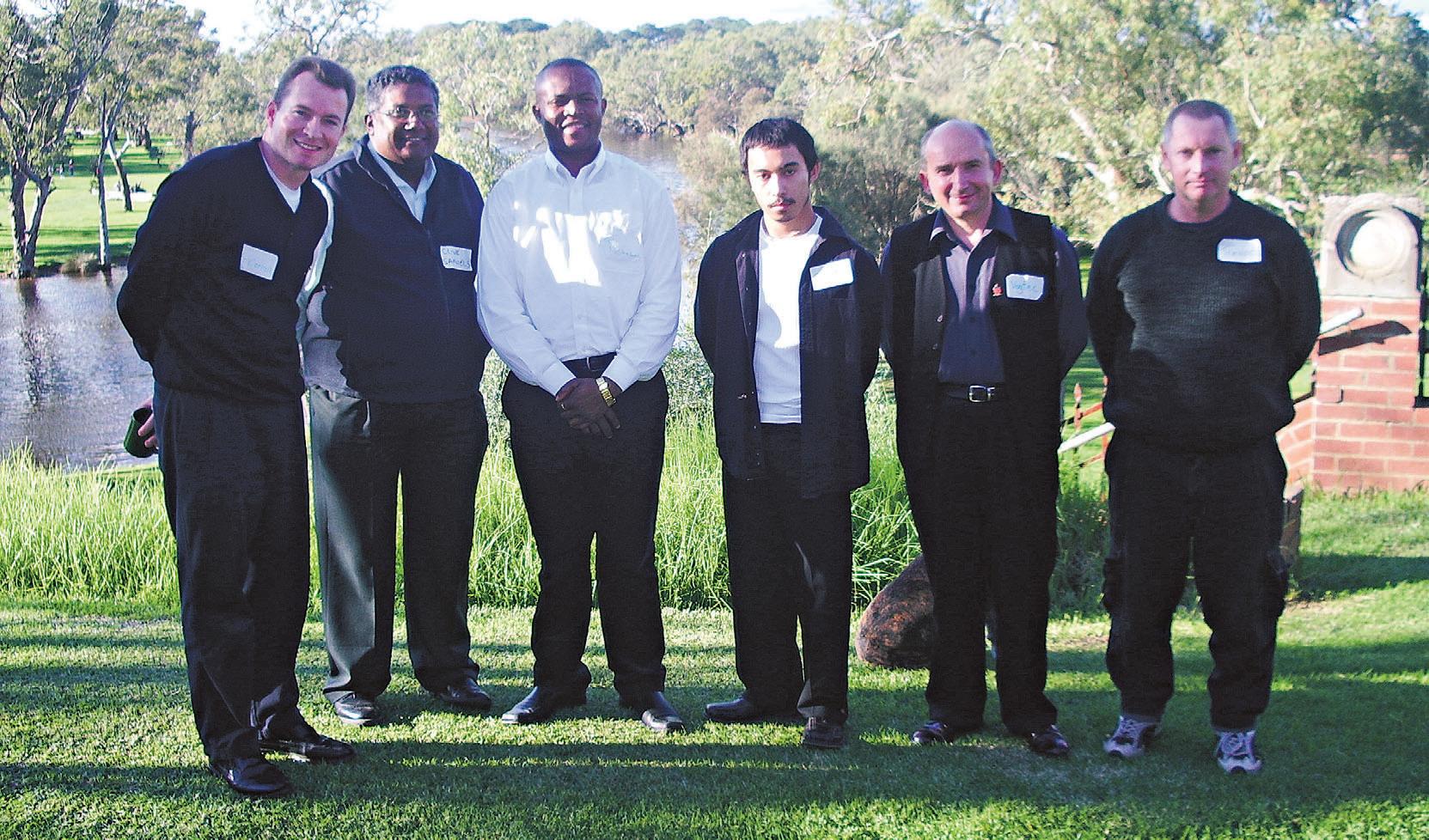
Latin, meaning that a seminary is the literally the ‘seed-bed’ where priestly vocations are planted and formed. Fr Nino Vinciguerra spoke about the spirituality of a seminarian and the central importance of prayer in vocational discernment.
Fr Tim Deeter, the Director of the Casa Frassati Discernment Centre, remarked that this day was an important first-step into finding out what God’s will for each
50 years all for God, others
The 50th anniversary of Mgr O’Shea on June 12 2005 was celebrated with what he does best - saying Mass in the Holy Trinity Church Rottnest Island
Msgr O’Shea was ordained at All Hallows College, Drumcondra, Dublin in 1955.
Nearly 30 winter holiday makers joined in the cuppa at the old picture theatre after the Mass with a cake donated by the cook at Kingston barracks. The old picture theatre was significant as this was the venue Mgr O’Shea had used for the 11am Sunday Mass on Rottnest Island prior to building the church which stands on the hill overlooking Thomson Bay.
As local chaplain to the apostleship of the sea which included 20 years as national chaplain, Mgr O’Shea has given much of his priestly life to those who live and work on the great oceans of the world.
During his time as national chaplain to seafarers he traveled by road ten times around the coast of Australia visiting the seafarers in all ports and encouraging the chaplaincy.
During the Mass, Mgr O’Shea gave thanks to God for the many people who had helped him in his priestly vocation. He also wore the vestments his aunt - a nun working with the poor in East London - had given him for his ordination 50 years ago. Mgr O’Shea reminisced on those childhood days at Kilkee, county Clare overlooking the Atlantic Ocean and gave thanks for the life he now led as chaplain to the many holidaymakers who find God at The Holy Trinity Church Rottnest.
enquirer was.
The new Seminary Dean of Studies, Fr Brian Limbourn, was also briefly introduced, as was Fr Don Hughes OMI, the newly appointed Rector and ‘old-boy’ of St Charles’ Seminary .
The day concluded with Eucharistic Adoration and a concelebrated Mass led by Bishop Don Sproxton.
The Bishop used his homily to
draw a parallel between the leap of faith made by Abraham in following God’s call and the leap of faith required by an enquirer as they leave everything behind to follow God’s call. He also spoke of his own vocational journey to the priesthood, telling the enquirers that God’s call had put his own ‘plans’ to become an architect on hold indefinitely! A good number of diocesan priests
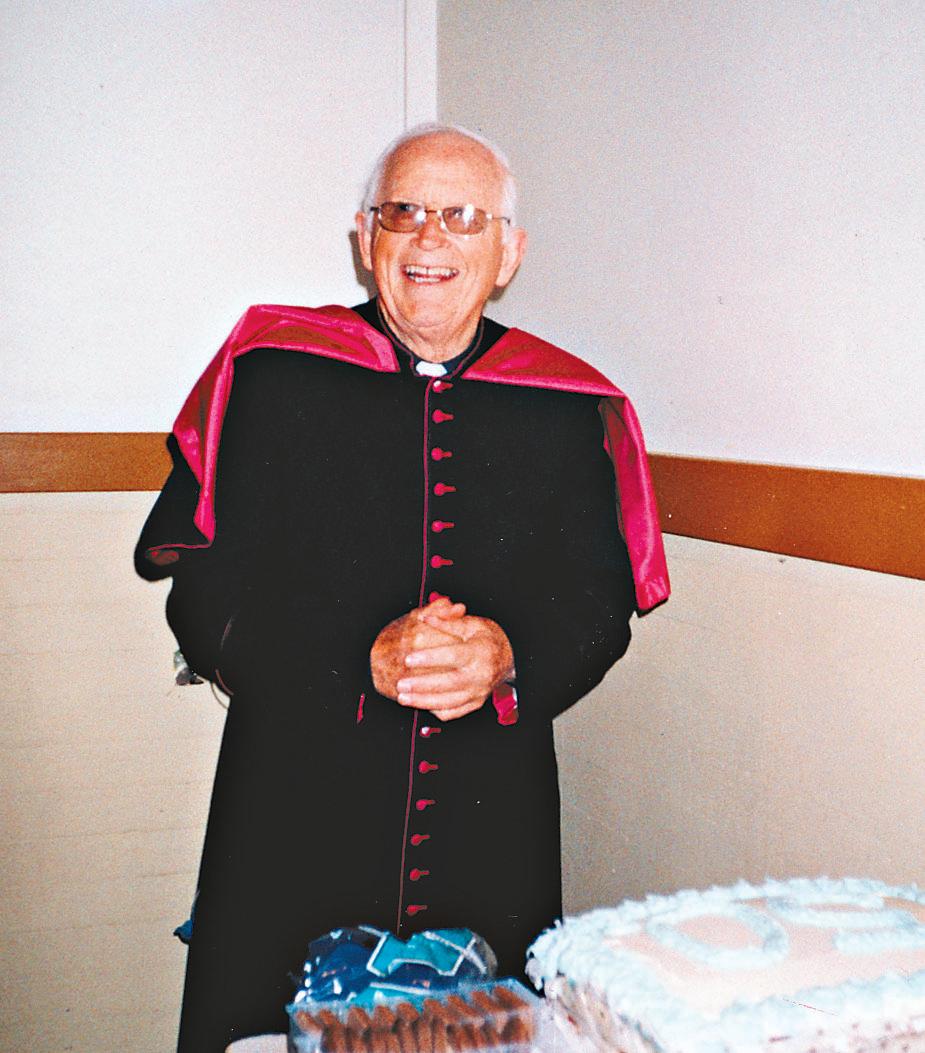
were in attendance and the day saw visits from Fathers Thai Vu, Robert Cross, Brandon Crawford, Paul Fox, Francis Ly, Michael Merrifield, and John Lisle. As well as these, the transitional deacons preparing for priestly ordination in December were also in attendance.
For more information about vocations please contact Fr Corran Pike on 9271 5253 or St Charles Seminary 9279 1310.
Children’s development
The Catholic Education Office of WA is inviting all parents to be part of an exciting, new monthly seminar series examining what they can do to maximise the future development of their children, become more confident parents and better understand their children’s needs.
Known as Light On The Hill, the seminar series will offer an insight into some of the challenges facing children today.
The first seminar will be held on Monday June 20 and subsequently on the third Monday of each month up to and including November.
The inaugural seminar, Building Resiliency in the Early Years, will be facilitated by Erin Erceg, Co-Director of the Child Health Promotion Research Unit at Edith Cowan University and Manager of the Friendly Schools and Families Program. The seminar will commence at 7:30pm in the James Nestor Hall at the Catholic Education Centre.
Onsite creche facilities are available, however reservations must be received one week prior to the seminar. Registrations should be made with the Catholic Education Office on 9212 9201.
Page 12 June 16 2005, The Record
Fr Corran Pike, left acting Vocations Director at St Charles Seminary, with seminarians and some of the men who enquired about the Priesthood.
Mgr O’Shea has a laugh on the occasion of his 50th anniversary as a priest.



































 Dr Simon Adams
Dr Simon Adams











 ■ With Derek Boylen
■ With Derek Boylen









